 |
 |
 |
 |
 |
 |
 |
Johnson has been involved in the South Florida punk scene since it's inception. He photographed/roadied for the Cichlids, played in the Eggs, the DT Martyrs, the Chant, the Vidalias, the Bogues, co-produced the Jody Grind's first album, and put together the Monkees tribute album and gig. He was a part of Safety Net Records, which released many fine musical projects that may have otherwise been unheard. He currently plays in the Skylarks, as well as continuing work on his own music.
Jimmy and I have been having regular phone conversations, since 2005. His memory is keen and he's got a great sense of humor, albeit spiced with a healthy dose of realism. He's been a great friend and mentor to me, he's taught me massive amounts about the South Florida scene, the Atlanta and Athens scenes, music and sound, people and places, and life and how to live it. And he opened up his enormous collection of audio and visual archives for Trashfever.com and the South Florida Punk Archives.
He also encouraged me to contact Bloodshot Records, and a couple years later Bar Band Americanus created a Charlie Pickett renaissance, and Charlie's first out-of-state gigs in 20 years.
You can find some of Jimmy's work around, so I highly recommend that you get you some. The Vidalias stuff and the Skylarks stuff I found on Amazon, along with the Jody Grind. The Bogues record is at casinomusic.com. the Chant albums are on ebay and Gemm, also found a copy of the Monkees tribute album on ebay. The rest of the Safety Net stuff is a little bit tougher to find...
1-EARLY DAYS
Jeff: Tell me about where you were born, and memories from growing up.
Jimmy: I was born in DC, Washington DC, and I lived just outside in Kensington, Maryland. And the only thing I remember about that mostly is just...snow in the winter. You know, just hangin' out. We moved away from there when I was 9, so most of my memories are just...hangin' out, playin' with my friends. And...really not...accomplishing or doing much of anything.
Jeff: And you moved down here when you were 9?
Jimmy: Yep.
Jeff: You moved to...
Jimmy: Ft Lauderdale. And I just had a normal upbringing, went to school and...didn't really accomplish much. And started playing guitar somewhere around 1965, and then of course, couldn't do it, so then I stopped. And picked it up again after several of my friends had some interest in it. My friend Bob Teeghman bought an electric guitar. So he started to learn how to play that, and I said "Oh, I better learn how to play that."
So then (The Who's) Tommy came out, and that sort of reinvigorated my interest. After Pinball Wizard, I said, "Oh, I have to do that." And then I actually learned how to do that.
Jeff: How about other music you were into? I know you're a huge Beatles fan...
Jimmy: Huge Beatles fan. At the time, we were listening to the White Album, Tommy, Steppenwolf Live, that was the big one on the playlist. Um, and everything else in between, you know, lotta Jimi Hendrix and...anybody who was big at the time. And then Live At Leeds was huge, that was huge. And then a lot of the one-hit wonder stuff that was on at the time, when it was melding from the AM (radio) hits to the FM. They'd play the b-sides and stuff.
Jeff: They'd play album tracks.
Jimmy: Yeah, and album tracks. And then the innovative DJs on the AM stations would start playing the flip sides of stuff. So then we went from WQAM to WSRF, and when surf (WSRF was known as 'surf') kicked in, that was when the real thing happened. And then there was Magic Bus out of (West)Palm Beach, I think it was WBUS, Magic Bus. They were the first ones to really, that I remember, to really fire it off. Then WSRF and WSHE started down here, they were sister stations, AM and FM. And some of the DJs were the same, they had different monikers for AM and FM.
So those were fun days, and it was a real learning...that's where everything really started to pick up.
Jeff: Yeah, that's where you get your bassline for everything you do after that.
Jimmy: Yeah.
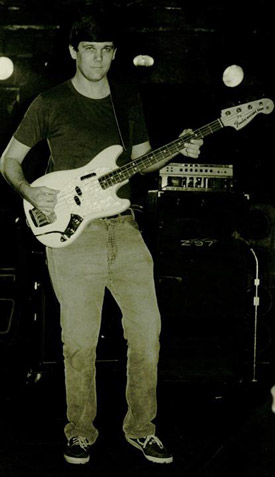
Jimmy Onstage With the Eggs, 1981
Jimmy: Northeast High, Ft Lauderdale, in 1973, I think it was.
Jeff: And did you ever have any piano lessons or guitar lessons?
Jimmy: No piano, but I took lessons from...there was a great music store and it still exists, it's called Modern Music, and it's run by the same guy, John Gallagher. And he was in a band, and everybody in the band worked there. And the guitar player gave guitar lessons. So I took guitar lessons there. And that was where everybody...it wasn't the kinda store where you go in, and if a guitar was $600, it was $600 and that was it. This was the kinda place where if it was $600 they'd give it to you for...$510. "Wow, you give discounts, really?" Strings were $2 instead of $5. So everybody started going there, and it turned into a real hangout, and that's how a lot of people met each other. So, that's where I got a lot of my instruments, I got my white (Fender Precision)P-bass there in...must've been 1983. They had a half-price sale, and I went in to get a Rickenbacker 4001, and they were sold out. So they had a choice between a white P-bass and a black P-bass, and I took the white one.
Jeff: And you still have it, right?
Jimmy: I still have it, I just had it re-fretted for the first time. And it still sounds great, and it still plays great. I haven't played it every day since I got it, 'cause I bought my Hofner bass there too (small, violin-shaped bass that Paul McCartney played in the Beatles). I played that for a year in another band. And then I bought another bass up in Atlanta which I used for 3 years, a Gibson. So I'm back to playing the P-bass pretty much 100%.
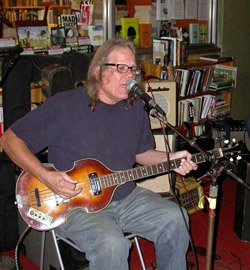
Jimmy Playing His Hofner Bass with the Skylarks
Jeff: You like the feel of it, obviously.
Jimmy: Yeah. Well it feels like, "Oh, I'm playing my bass now." (laughs)
Jeff: So how did you get into photography and writing, and doing stuff for the Hollywood Sun-Tattler after high school? What happened in between?
Jimmy: Well, I only got a few things in the Sun-Tattler because Cameron Cohick was the writer. And so that's how I got a few pictures in there. But I really, most of the time, worked for The Rag. And that was because I saw it on the newsstand when it came out, or in the music store. And said, "Wow, this is cool. I take pictures. I wonder if I could take pictures for them?" So I called 'em up and they said "Yeah, bring some down." And so I did. Or, "Go take pictures for this show." And I did. So...I guess I did stuff for them for the better part of 4 years.
Jeff: Photography was an interest for you back in school?
Jimmy: Oh yeah, in high school, all the way back to 1971, '70. They had a darkroom in my graphics class. And I still have some of the prints from those days, (of) Alice Cooper.
Jeff: Yeah, you took pictures of Alice Cooper?
Jimmy: Took a lot of pictures of "the Coop." And...the Allman Brothers.
2-THE CICHLIDS

Cichlids and friends, Yeehaw Junction; photo by Jim Johnson
Jimmy: That's right. It was at Peaches Records on Sunrise (Blvd, in Ft Lauderdale.)
Jeff: The same Peaches that the Cichlids played at later?
Jimmy: Yes, the Halloween show. And I was walkin' out and I saw this, and I said, "Who are these girls?" I just picked it up and went, "Wow! Look at this band!" I found this issue of Mouth Of The Rat with Debbie and Susan on the front. And I guess that was taken the first time they played at Musicians Exchange. And I was just taken by...them.
Jeff: So how did you get in touch with them?
Jimmy: Well, I just started asking around, and just got..."Does anybody know about this band?" "No." 'Cause nobody I hung out with hung out with anybody from that whole new thing that was coming up. And I had always found various original bands, like my friend I went to school with, Bill Bate, who has Live Bait here, I think he still plays under that name. And a band called Camron, they played the Big Daddy's circuit (of clubs), like 4 sets a night, so they obviously had to play a lot of covers, but they would just throw in originals. And it was the originals that were interesting. It's not that they weren't great musicians, they certainly were. But it was like, "Wow, they're playing their own stuff, this is REALLY good." So this (the Cichlids) was just an extension of that, but like the whole other side of the coin.

Middle-Robert Mascaro, right, Joe Harris
Jimmy: It was at the famous show at FAU. With the EAT and Razor. Razor was the band that did Allman Brothers covers. And it was everything I was hoping it would be. It was amazing. So me and this guy I went with, who was the only guy I could find who was halfway interested in seeing this band, we drove all the way up to FAU. And it was amazing, I couldn't believe the energy level. It was just something I hadn't experienced, because they were young, and they were..."Oh my god, they did a Monkees song!" They did Pleasant Valley Sunday, my favorite Monkees song.
Jeff: And until then you weren't really into the whole punk thing.
Jimmy: I wasn't too interested in it because it just seemed like a lot of people were just playing badly for the sake of playing badly, and then calling themselves artists. "I'm an artist 'cause I can't play guitar." Well...in further reinvestigation of that, they were actually pretty good, but you have to kinda fall into the understanding area.
Jeff: The Cichlids were your "in" (to the punk rock genre.)
Jimmy: Yeah. Once I started hanging around with them, listening to this stuff finally, and hearing it really for the first time...Because a lot of times, the people that you're with can kind of, taint your opinions. If EVERYBODY says "This band sucks.", more likely than not the whole group agrees.
Jeff: Of course, peer pressure.
Jimmy: Peer pressure. So then it's like "Oh, I wasn't interested in the Sex Pistols because they caused all this trouble." And you heard more about the trouble they caused than the music. Then when you actually get over the fact that they were causing all this trouble, which was nothing more than publicity stunts to begin with anyways, then you realize that there was something there.
Jeff: They could actually play.
Jimmy: They actually could play, their record was really good.
Jeff: it wasn't just their manager trying to get them on TV.
Jimmy: Right, that's what he did. And then all these other bands, it's like, "These people have been around for so long, I can't BELIEVE that I never heard these people." One was also living down here, where you weren't exposed to it. It wasn't played on the radio, nobody wrote about it.
Jeff: Yeah, it wasn't on the radio in Tampa. The first thing I heard was Elvis Costello, Joe Jackson, and I had to go backwards from there.
Jimmy: Yeah. Well the thing is, I remember (radio station) ZETA 4 lunchtime album. And they played "Look Sharp". And I was listening to it and..."Oh my god! I cannot believe this record. This is one of the greatest things I've ever heard in my life." Because it was coming at the end of the Journey/Styx...
Jeff: Oh yeah, it was a total rejection of that....
Jimmy: ...Revelation of, "Oh, this guy actually sings like a guy. This guitar tone actually sounds like a guitar tone instead of a dentist drill." You can actually hear the bass, the bass is round and tubby, as opposed to just mixed in with this completely flat, caked-out drum kit, which has no resonance, no life to it. I couldn't even tell what key any of the (Journey/Styx) songs were in. And then here's this thing with these guys, where the guitar is here, the bass is here, the drums are here, and the singer's here, and you can here every single note of every single instrument, and it all makes sense. And it was one of those, you know how Mojo (magazine) has "Last night a record changed my life"? Put that one (Look Sharp) at the top. Beatles first album, then Joe Jackson. Love It To Death, Alice Cooper.
Jeff: And coincidentally, you're good friends with Joe Jackson's bass player Graham Maby.
Jimmy: As it turns out, he ended up playing with the Silos for a tour, and we ended up driving in my van for a good amount of the time, and...we had many discussions about the old days with the Joe Jackson Band. Many of them I wish we had a tape running like this.
Jeff: And you're still good friends to this day, right?
Jimmy: Still keep up and see him every time he comes to town.
Jeff: Ok, back to the Cichlids. The first time you met Robert Mascaro...
Jimmy: ...Was there at the Cichlids show at FAU.
Jeff: You talked to him at that gig?
Jimmy: Yeah, I told him I had pictures. And he goes, "Ok, well, here's my phone number. Call me when you get 'em done." So I handed 'em in to the Rag, and...somebody else wrote the copy, but they used my pictures. I can't remember if Dino, who ran the Rag, Dino and Sandy. I can't remember if he wrote it or somebody else did, 'cause I don't have a copy. I haven't seen it in so long. But I know that they used my pictures, and I know that I didn't write it. That I do know.
Jeff: And you did write something about them for some high school paper?
Jimmy: Did I?
Jeff: It's on the website, we don't have to talk about it if you don't want to.
Jimmy: It's not that I don't want to talk about it, it's just that I don't remember.
Jeff: So did you start helping the Cichlids immediately?
Jimmy: No. I just started going to the shows and...became a fan immediately, and would take just loads and loads of pictures, and then just..."Here I took these this morning, and now they're all printed. I'm taking these now, you'll get 'em in an hour." And I couldn't do enough, I couldn't develop them fast enough, I couldn't take enough pictures, I couldn't go to enough shows, you know? And it was just...it was all-encompassing, and literally...it really took over everything that I did from then on, a lot of stuff just went right out the window.
Jeff: What stuff went out the window?
Jimmy: All the other bands.
Jeff: So you were into the South Florida punk scene right away.
Jimmy: So immediately it was like, this is the ONLY thing I wanna do. I've been waiting for this my whole life.
Jeff: The MISSION. (BOY, lemme tell you, do I know about this.)
Jimmy: The MISSION, right. And from them, I got to meet Charlie, and the EAT, and the Screaming Sneakers.
Jeff: And the Bobs later.
Jimmy: Well the Bobs, I was a friend of Bob Rupe from high school. And I met the Reactions, and I met Salton when he was in the Reactions, and then he started playing with Charlie. But the intermediate step is this. The intermediate step of knowing about the Cichlids, not seeing them, but reading about it in Mouth Of The Rat, and having a little bit of...chatting from people. My friend and I went to see Robert Fripp, at Peaches, do the guitar thing that he did. He eventually put out a record (God Save The Queen/Under Heavy Manners?) I can't remember the name of that thing where he would use his 2-track (recorder), where he would just do the sound-on-sound thing, and record it live in front of people, but no audience sound. And there's a guy there with a Cichlids t-shirt, this little skinny guy with a shaggy haircut. But it (the t-shirt) was done with a magic marker. It's like, "Where'd you get that shirt?" "I made it." "Have you ever seen them?" "Yeah." "Really? When do you see them?" "I work with them." "Oh really? When are they playing next?" "At FAU." "Oh, ok. I'll look out for that." It turned out to be John Daniels (who Jimmy joined as a roadie for the Cichlids).
Jeff: Ok, so you knew John and you knew Robert, and you were taking pictures of the band, and going to all their gigs. So when did you actually start roadie-ing for the band?
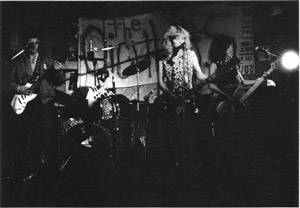
Cichlids at the Buffalo Roadhouse; Photo: Jim Johnson
Jeff: The Knights Inn.
Jimmy: The Knights Inn, thank you! Somebody passed around bad quaaludes, and being the good person that I am (facetiously), never did and don't take quaaludes, I wasn't involved in that. But we woke up the next morning, and the whole place was LITTERED with people, all around the pool, all in the parking lot, it looked like (the) Jonestown massacre, which had just happened at the time. You wouldn't believe it. Everybody looked dead, it looked like there was 50 dead kids with purple hair and...
Jeff: 50 dead punk rockers.
Jimmy: Yeah, all laying around. And it was like, "Oh my god, what happened last night?" Nobody could remember. And the reason I can't remember is that I went to bed. But everybody else stayed up. And that night, that Saturday night, somebody from Zenith Nadir accused the whole Cichlids contingent of bringing up bad quaaludes (from South Florida) and poisoning the whole Tampa scene. Which was completely untrue, as far as I know. (laughs) To the best of my knowledge, I had no idea who poisoned...
Jeff: But since you were with the band, if somebody from the Cichlids' organization was passing out quaaludes, you would've known about it?
Jimmy: Not necessarily. There was a lot of stuff that happened that I didn't know about. BUT, I would have to say...that I had no knowledge of this action. (laughs) So we tried to quell it (the controversy) the best we could, by denying it, of course. But...I don't know if anybody believed us, 'cause we were the out-of-town band, and why would anybody believe the out-of-town band when the in-town band was accusing everybody? So they believed them, I believe. And then of course, later on I became very close with at least 2 of those...members of Zenith Nadir. And at least one of them, I still see quite a bit. James, the bass player. He went into Right As Rain, which is a band I hung out with in Atlanta.

Cichlids, Peaches Record Store, Halloween, 1979; photos by Jim Johnson
Jimmy: There was something going on that night that I wasn't privy to. I just went there, this is before I got...past that door. I was still just a huge fan, takin' a lot of pictures, hangin' out as much as I could, without really being invited anywhere. After that was over, they all went down to the Treehouse to see Chi Pig, who came in from Ohio, who I eventually saw and interviewed for the Rag. But they were all goin' down there, and I asked, I said "Where's everybody goiní?" "Oh, I was just blah blah blah I don't know. We're just gonna do something. See ya later!" It's like all ya had to do was say you were goin to the Treehouse, it's a public place. You don't have to treat it like you're going to some crazy, behind-the-door...
Jeff: One of those Mascaro secretive things?
Jimmy: Yeah, "Don't tell anybody where you're going, we don't want everybody comin'." Ok, so here's the thing. I didn't go down to the Treehouse to see Chi Pig with them. I stayed, and I was on the phone, callin' somebody. I was on the pay phone outside, callin' somebody. And there's this girl who was standin' there. And when I got off the phone, she said, "Can I get a ride from you?" And I said "Where?" And I'm thinkin' to Boston, you know? You know, usually people ask you for a ride, and...
Jeff: You didn't know her, she was a total stranger?
Jimmy: TOTAL stranger. To someplace where you're never gonna go, and it's gonna cost ya $100 in gas, and then you're gonna get wrapped up in something that...you're gonna regret it, you know? She said, "I wanna stay at my brother's house, he's closer than my parents, and I don't have a car, and somebody dropped me off here, my brother lives somewhere." Ok, so we started talking. And she said "Well what are you gonna do?" And I said "Well I'm gonna go see my friend over here, at this place called Beethoven's. My friend is doing the sound for this thing, and they do little short plays like, they'll do The Wiz for one set, and they'll do another musical for another set, it's a rock band. So even though it's The Wiz, it's still pretty rock, pretty great." So she said "I can go do that." Ok, so we'll go do that. Well, it turns out...this girl's now in our lives, this girl ended up dating Bob Rupe, through me. 'Cause we went out a couple times, and then she kinda fell for Bob, and that's ok, because everybody did.
Jeff: Bob's a good-lookin' guy.
Jimmy: He's a good-lookin' guy, he had just come off the road...and he had the look goin' on, he was real...non-flabby. (laughs) He had the right haircut, ya know...
Jeff: He had the short hair swept off to the side, same as MacIvor.
Jimmy: Yep. He had that brown hair, and he was a good-lookin' guy, and that's just the way it went down in the dance hall days, everybody went for Bob, ya know? And then she ended up being the Safety Net (Records) logo girl, and she was great, and now I haven't seen her in years. Sena. I hope to run into her sometime. So the Halloween show at Peaches was broadcast on WSHE. And that was a big thing, because bands of that stature did not get live broadcasts from places.
Jeff: And the band did an interview on WSHE a couple weeks before that, which somehow ended up stuck on the end of the God Punishes The EAT 2-track master.
Jimmy: But they were great that night, they really blew it out. They really showed what the whole fuss was about.
Jeff: And the photos you took of the band that night reflect that.
Jimmy: And the pictures, I have to say, I was lucky. Because they lit the place...I don't know why it was so over-lit. They really had the place overly lit. So I was able to take some really fine pictures. And the one picture where you can see the whole band, and Allan jumping off of the riser with his legs spread open, and the guitar way up like that, I was always hopin' would be used for press purposes, to be sent around for reviews and interviews and stuff like that. There wasn't much national press, even though there should've been. I don't know what happened there, but. A lot of these pictures, they just sit, unused and unseen. I would really love to do a retrospective of my time there, back in those days, and it's a good idea, but it's one of those things that...really, who else cares?
3--THE SCENE
Jimmy: I think our scene, the south Florida scene at that time, and that includes a lot of bands also, that came after that. And bands that got overlooked at that time because other bands were getting all the press, were as good as anybody. But people just went to L.A. and New York, and said "These bands are the best because they're in L.A. and New York." Well, if, for some reason, the Cichlids and the EAT and Charlie and other bands, were in L.A. or New York, they would've gotten that same attention that those bands got. But because they were down here, it just was at the fringe...
Jeff: It was a whole different era, there was no internet, the only way you found out what a band looked like, or what they had to say was by lookin' at the album cover, or if they had a magazine article. And how many music magazines were there? There was Rolling Stone, Creem, Hit Parader, Circus, and that's it.
Jimmy: And Hit Parader covered a lot of weird bands from New York in the seventies, but they didn't necessarily...
Jeff: And then later on they went heavy metal. And Creem dissolved, and Rolling Stone sucked.
Jimmy: And there was David's magazine, Mouth Of The Rat, that did get around. There was a lot of those homemade magazines that got around quite a bit. I mean, if you read the back of those magazines, people would write letters and say, "I'm from Milwaukee, and I've heard of this band the Cichlids. Can somebody send me a tape?" Something like that.
Jeff: So seeds were planted, but not enough.
Jimmy: Not enough, it just wasn't enough. And for whatever reason, it just wasn't enough to keep the band together, to keep the interest going, and...it just fell apart.
Jeff: At the height of their powers, when they were making a really big splash down here, how often were the Cichlids playing?
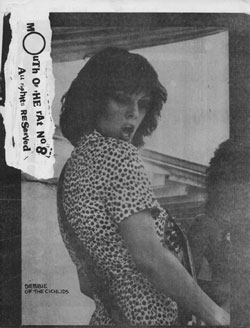
Cover of the Mouth Of The Rat, No. 8,
the one that started it all for Jimmy.
4--THE CICHLIDS 2

Jimmy: Well, through Robert. I mean I remember him and...he was married to this girl we called Fish. And then later on Cathy. But I remember...being at the house in Dania (the duplex where Robert Mascaro, Debbie Deneese, Susan Robbins, and Charlie Pickett lived) when they were trying to get the Cichlids' album cover together. I think that...there was some discussion about that. But then (Rolling Stone Magazine photographer) Lynn Goldsmith ended up taking the picture, and it was out of everybody's hand, everybody local. You know, it was just in the hands of the record company. So nobody got to do anything, but there was a promo single of "Lifeguard Dan" which I took the back cover of.
Jeff: With Charlie's legs sticking up out of the water...
Jimmy: And Debbie took the cover (picture) of Susan in the lifeguard stand, looking like she's throwing her top off. She was throwing another top off. (laughs) But because the band was in flux at the time, (guitarist) Allan (Portman) was fired, and I really don't know where (drummer) Bobby Tak stood at the time, but they just took Debbie and Susan, and just to give the illusion of the band with the 2 guys and 2 girls, they had John Daniels and Charlie's legs comin' up out of the water, with the 2 girls. And that got on the back, and the lifeguard picture got on the front, which was great. It worked out just fine. And then of course there's the video. After that (guitarist) Barry (Seiver) got in the band, so then they made the video, which I thought was really well-done, really nice for the time. I thought they did a pretty good job...Cory James and John Robson.
Jeff: Right. Hopefully a better quality version of that will surface at some point.
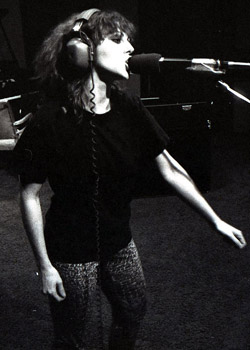
Debbie recording vocals for Lifeguard Dan
Photo: Jim Johnson
Jeff: What I've heard, and deduced from listening to people, is that Mascaro had enough clout to get the Cichlids signed, but that once it got into the making of the record, he didn't have any say, he didn't have any control, it became Ann Holloway and the people at TK Records.
Jimmy: Probably. But I don't know because I wasn't privy to a lot of that stuff.
Jeff: What do you think of the record?
Jimmy: Well I listen to it and think it's a shame that this is the only thing that's left, and that the great stuff, with Tony (Mancino) and Hal Spector, recorded at the house in Hollywood, it was just so badly recorded, because they were learning, as they said, "We were just learning how to use that stuff, and they were just guinea pigs." It's just so badly recorded that it's difficult to listen to. And it's not the kinda stuff where you go, "This stuff sucks so bad it's fantastic!" It's like this is really unlistenable. There's nothing aesthetic or artistic about it, it's just...bad.
Jeff: Do you think Henry Stone from TK will ever dig out the master tapes, if they still exist?
Jimmy: I'm sure they exist, but I don't really know if they care to find 'em, or if they even cared to keep 'em.
Jeff: It sure would be nice if they let somebody who knew what they were doing have a go at 'em.
Jimmy: Well here's the thing. The reason why a lot of those 7" records (Cichlids promo single) were saved, and also the cassettes and the very few 8-tracks, is because somebody went dumpster-diving down there, 'cause they threw them all out. They said, "Well this didn't sell worth a shit, so we're gonna heave it all." And they did. And somebody was down there that day, and pulled out all that stuff, they knew what they were lookin' at. And it was somebody from the scene, and I can't remember for the life of me who it was, Ted Gottfried might remember.
Jeff: They only sold 3000-some copies, and they rest they just tossed 'em?
Jimmy: They tossed 'em, and somebody rescued 'em. But that's where we got all the singles from. But they (TK) did give us a bunch of singles because we had a single party at Robert's where everybody sat around and sent promos to radio (stations) . Everybody got a portion of the list, and Long Jim White was there, who was a DJ on WSHE. So he was addressing them, I was addressing them, everybody in the band was addressing these things and putting them in. This is from what I remember, it could be another drug-induced dream. But I don't think it was, I'm pretty sure.
Jeff: Did TK put any money into promoting this record at all?
Jimmy: Well, I know that they sent 'em out, because we got reviews. But as far as buying a page in Billboard (magazine) ,NO!
Jeff: As far as even knowing what to do with a rock band, because they were a soul/R&B/disco label. They had some early Allman Brothers, I guess.
Jimmy: Yeah, the Allman Joys. That sorta sold on it's own, simply because of the legacy factor. And I'm sure people weren't pounding down the door for early Gregg and Duane demos. Interesting to listen to, I never actually heard it, but I'd like to, just to hear it. But there was a review from Lester Bangs, the very famous, and irresistibly cute Lester Bangs (laughs) , that guy, he did all kindsa crazy stuff. He was something. He hated it, apparently.
Jeff: Not surprising. It's a piss-poor reflection of the band. The production is a joke.
Jimmy: Not surprising. Yeah, and Ann Holloway is not a bad producer. That's the thing, I don't know what happened.
Jeff: Not a good match between the band and the producer?
Jimmy: Maybe. Or maybe somebody else came in and...put something between 'em. I wasn't there. All I know is the stuff that came out of Tony Mancino's place (Music Labs) with the EAT and the Bobs and some of the other stuff from Sync (studios) blew it so far out of the water it's not even funny. On 8 or 10 microphones in a room, you can make a record, you know? What happened to this record? Nobody seems to know. However, again, trying to find the shining light...within this whole thing. Lifeguard Dan is brilliant. Lifeguard Dan, the production worked. It was...absolutely beautiful. Well played, well written, really well executed. The funny thing about that is...when Debbie did the vocals, which was the only time I was down there, she was on the cusp of laryngitis. And she did all that great background stuff, and all that great singing, drinking...something. Robitussin, or whatever you drink for a cold, or the flu.
Jeff: She did all the vocals on that?
Jimmy: As far as I know, except for the part that goes "There goes lifeguard Dan." That's Robert.
Jeff: Robert Mascaro?
Jimmy: Yeah. (imitates Robert) "Don't tell anybody. It's a big secret." "Ok." Sorry Robert, I had to spill something. But I think all-in-all...maybe the song choices weren't good. There was at least one song that, to me, was always a throwaway of their live set, but sort of reflected the time. But I always thought it could've been replaced with (John Fred & His Playboys' one-hit wonder) Judy In Disguise, or some kinda great pop song (laughs). But that's just me.
Jeff: So what's the song in question?
Jimmy: Planned Obsolescence. I could take it or leave it, I always could, it was never one of my favorites. BUT, it's true. It's just a sentiment that a lot of people thought. But to me, there could've been something a little bit more interesting to put on the record than that. And if that's the only thing, then we're ahead of the game.
Jeff: So Allan Portman was a little bit of an odd bird. Did you see any of that coming?
Jimmy: No...
Jeff: He just kinda left out of the blue?
Jimmy: You know, I hafta tell you, quite honestly, I don't know what happened. If I did know what happened, I knew about it then, and since that's almost 30 years ago, I couldn't honestly tell you what happened. All I know is that one day...I do know this--the first time that they played "Lifeguard Dan" live was an encore at the Agora. And somewhere along the line, I knew Charlie was gonna play with them. But I didn't know what or where or why, or anything. And I was out front taking pictures. And Allan come out, and he goes...and I don't remember exactly, so I'll paraphrase..."This is a new song, I'm not gonna play, Charlie is. It's called Lifeguard Dan." And they played it without, from what I recall, without the organ. And it's like, "Wow, wonder what that was about?" And it turns out that, from what I remember, that was the last time Allan played. And it was like, "Oh, ok." 'Cause somewhere along the line, somebody said that Allan...was fired, or left the band, or something. And no explanation was given to me. And it seems to me that was the last time they played for a very long time.
Jeff: How many times were you in the studio while they were cutting the record? (Be True To Your School)
Jimmy: One time, I was there for the Lifeguard Dan vocals, and that's it.
Jeff: So you wouldn't know how much Portman played on the album?
Jimmy: No. All I know is they put together, a lot of his leads were spliced together. The one story I do know is that they were listening back to the final record, and the lead to "Jewish Girls" comes on. And apparently Allan leans over to somebody and says, "I never played that!" And it was a compilation of many takes that they had scissored together. I mean it's him playing it, but whether he played it the way it was or not, it was still good. They did a pretty good job of tacking that together. That was the band, though. THAT WAS THE BAND.
Jeff: Yeah, everybody has said, including Susan and Bobby, that once Allan left, the chemistry was gone.
Jimmy: Yeah, it wasn't 100% gone, but it did lack a little. And believe me, it had NOTHING to do with Barry.
Jeff: Right, Barry's a good player.
Jimmy: Barry's a GREAT player. And Barry filled a pretty hard slot to fill. I think anybody who went into that slot would've had a hard time. He just took it by the balls and let it fly. Allan was a very...piecemeal-y kind of a guitar player, you know...very low-tech. But Barry...was not! Barry could FLY! He could REALLY fly...some of his leads. And they certainly turned a lot of the songs around, because he would just play...like he was on FIRE on some of those things. Whereas Allan was like 2 to 10 notes...It did change the landscape of the songs but I don't feel that it...It certainly didn't ruin it like a lot of people said. He also sang a lot of back-ups (vocals). He sang more. And I think that helped. So they played a couple times, they did the video for Lifeguard Dan. So when they finally ending up playing Lifeguard Dan live, Susan played the organ and Barry played bass. So we had a line that ran from the bass amp to the other side of the stage, so that when all that stuff occurred, we could do it really easily. And now I was not taking pictures anymore, I was up onstage 100% of the time. And I have VERY very few pictures of the Barry band, but I do have a few. Still...I think it worked. Because they had a coupla new songs, like Little White Dot...that needed a little bit more guitar prowess...
Jeff: Tell Him.
Jimmy: Yeah, they did Tell Him. That was an incredible cover, they did a great cover of Tell Him.
Jeff: The Volkswagon song.
Jimmy: Yeah, Beetlemania. And then there was the one about the...it was a pro-nuke song instead of an anti-nuke song...
Jeff: Sitting Ducks.
Jimmy: Sitting Ducks. Which wasn't completely untrue. There's a lot of people that thought the same way, that if we had continued to be...shuttin' down our defenses like that, that we were sitting ducks for people who weren't. And I think that it...wasn't all hooey. So to me, I think that they would've had a great interim single, when singles were still alive and kickin', of Little White Dot and Tell Him, that was my fantasy single. And...there was plenty of time to do it, believe me. But...for some reason, things on the managerial, and they just didn't...it didn't work out that way.
Jeff: Talk about Mascaro's management style, and what you thought of it, and how much you saw of it, how much you wanna talk about it. There's some unconventional tales.
Jimmy: Well, it was definitely an unconventional way of doing things, certainly not anything I would've thought of, or almost anybody I knew would think of something like this. But he did things like, "Don't fraternize with the other band, don't talk to the audience." And the one great thing about him is because he had an acting background, he would always physically show you how to do these things. Which I am NOT going to do. But he would say something like, "When we pull up to the club, I want you to MARCH into the back room, not look at anybody, and sit down until I get back there." But he wouldn't just say that, he would show you how to march into the room, how not to look at anybody, and how to sit down. (laughs) That's the way he did it, it was SO funny. It was like, "Can'tcha just say 'Go up in the back, and I'll show up in a few minutes'? 'I'll meet you back there.' Why d'ya have to go through this huge song-and-dance?" But he did, and I'm not saying it was a good thing or a bad thing, but he did, and that's...I think...and I'm pretty sure I'm right, and I'm pretty sure that's one of the things that helped the band...You know it's like, "Oh, I don't know anything about them. Nobody'll talk to me. I'll have to go back again." And it's like, "How come that girl never says anything? How come she won't talk to me? Maybe if I go again she'll talk to me." So I think that was part of it, part of the mystique.
Jeff: Some people say that the Cichlids would've never got anywhere without that.
Jimmy: Oh, I'm sure. And it was thoroughly unconventional, because nobody I knew in any band, like that band Camron that I hung out with at Big Daddy's, they were always sittin' on the stage, sharin' a beer with somebody, always talking about this, that, and the other. They were totally amiable and totally accessible. And I always thought that's the way you should be if you're in a band, because people pay money to come in and see you, why shut 'em out and tell 'em to get lost? But it was a whole different way of lookin' at it...
Jeff: Did you see the break-up coming? (the Cichlids losing Susan and Barry in July 1980)
Jimmy: No, I didn't see it coming until pretty much the last show in Gainesville, when it was over. And I'm not gonna get into that. But fortunately I had a really, really nice cassette machine. Stereo cassette machine that I had at the time, a Sony top-of-the-line, it was probably $200. And I recorded a lot of shows with them, and the last 2 shows in Gainesville, which we didn't know were gonna be the last 2 shows, which was a pick-up gig, because we were stuck there. So we have to make some money, so this club (Fridays) booked 'em. And I don't know who we played with. And Tony Mancino, who was the soundman at the time, set it up so there was one microphone on the (tape) machine, and then one went into the (sound) board. And we recorded those last 2 shows.
Jeff: Talk about being in Gainesville all week, you told me several stories about the band staying in a different place than you, and having to scrounge for...
Jimmy: For food. (laughs)
Jeff: A place to stay, and food, and...for a whole week. Being stuck there for a week.
Jimmy: We stayed in this guy's...there was a band up there called the Irritations. And there was this guy Ralph Box, who's still around, and I think he still uses that moniker. And we stayed at his place.
Jeff: Who's we?
Jimmy: Some of us. John Daniels for sure, Tak, Barry probably. And that was it. I think Tony, Robert, Debbie, and Susan stayed at Robert's friend's house. But what I was gonna say was, there was no hot water at this house, this was the best part about it. (laughs) So there was cold water showers, but they weren't very fulfilling. So when I finally got a chance to take a hot shower up at the other guy's house, who's name I've totally forgotten...that was like a blessing. We all went to his house for a hot meal, and I got a hot shower FINALLY after about 6 days.
Jeff: And then after the 2 gigs were played, and the big blow-up occurred...
Jimmy: We piled in to my Pontiac...So Susan went back to Ft Lauderdale, or Hollywood, or North Miami, with that guy she ended up marrying. Barry left...and John Daniels left too. So it was Robert, me, and Tak, and Debbie. And the 4 of us got in my Pontiac and drove to New York. OK...sometimes good ideas...are not the best idea. (laughing) Ok? They wanted to go up and find a new band, with current scenesters. People that may have been in a band at one time, that weren't doing anything. And put it together, and kind of make it like this...thing, this hipster band...bubbling under the current band, and then so-and-so from this band that broke up, and so-and-so from that band that broke up, and...Try to get it going. And it's not REALLY a bad idea, but it just didn't work out. So we stayed on this guy's floor in his apartment in the Village, this guy Jim Marshall who's still very much alive and well, and in music up there. This guy does radio shows, and writes. He's a really super guy. So he let us stay there, and it was an incredibly small apartment, for all of us and him, 'cause it was one of those one-bedroom apartments. In the basement, where you can look through the window, and there's the sidewalk, that kinda thing.
Jeff: How long did that last?
Jimmy: One night, one night for me. But, the one night...the great thing about these horrible ideas, and you have to find a good thing...that night at Max's (Kansas City, famous NYC club), which was in walking distance, was the New York Dolls appreciation night. And (famous rock photographer) Bob Gruen was showing some films that he had taken, incredible stuff, which has now surfaced, and I think you can actually buy a DVD. So they were being shown, so I walked up there. And I got to meet Johnny Thunders. He was very amiable, and he was super-nice, he was...incredibly small. And I said, "Oh, I'm from Ft Lauderdale, I write for this newspaper, and I'm tryin' to bring something home from...outta town. So can I get together with you, maybe over a cup of coffee, and do a little interview, and when I go home I'll have something cool to write about?" (High-pitched voice) "Oh yeah, sure!" And he wrote his name and phone number on, surprisingly enough, a Mouth Of The Rat. Because Dave Parsons had moved to New York, and put out Mouth Of The Rat, a few issues. It didn't last very long, but a few issues. And I still have it. So I...I had to leave. I said, "Ok, this is too much, I can't sleep on this guy's floor any more, there's too many people. My sister lives in Massachusetts, I'll go visit her." So I called him as I was leaving to tell him I couldn't hang around and do this. And I think that he had (laughs) come off a huge binge of some kind, because he was not very eloquent on the phone. It was sorta like "Arghrghrghrgh, ok man. Ok, right, bye." So I got in the car and I drove up to Massachusetts. With all the stuff, everybody's stuff still in the car. And that was a great drive, I went on that ferry that takes you up there, and I had a great time. And then I came home, and then I guess they had some meetings between the 2 of them, and Bobby and Debbie decided to carry on the name of the band. But it was gonna be a Steely Dan-type thing where it was just gonna be them 2 with hired people.
Jeff: And Mascaro stayed in NYC.
Jimmy: Mascaro stayed, he did not come back, he was out of the picture.
Jeff: He managed the Zantees.
Jimmy: The Zantees, he had something to do with them for the longest time.
Jeff: So who was working with the Cichlids after they got back?
Jimmy: Well, they kinda hooked up with the management team that was representing the Cichlids on this tour (Fantasma Productions). And they took over.
Jeff: And they only played 2-3 gigs, and then the band...just didn't work out with Bob Rupe and Derek Craig.
Jimmy: Bob had left the Roll N Pinz to play with these guys. And the guitarist in the Roll N Pinz was Kevin MacIvor.
Jeff: And the drummer in the Roll N Pinz was Johnny Stix.
Jimmy: At one time. He wasn't drummin' at the time that Bob left. So after the Cichlids blew up, Bob, Tak, and Kevin started the Bobs.
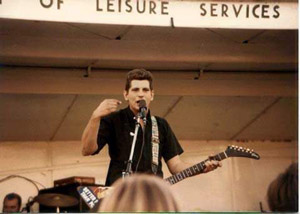
The Eat at FAU
5--THE EAT
Jeff: Talk about the EAT, first impressions, how did you meet the band...
Jimmy: Well, with the EAT, I saw 'em open for the Cichlids. I have to say, don't hold it against me folks, I didn't think much of it. I thought it was just EXTREMELY too loud, sorry again. And there was just a lot of stuff I didn't get, I was still trying to get my head around a lot of this stuff.
Jeff: The Cichlids stuff was a little bit more accessible.
Jimmy: It seems to me at the end of their set they (the EAT) did a Devo song. I could be mistaken but I don't think I am.
Jeff: Yeah, the EAT used to do Uncontrollable Urge.
Jimmy: And I thought that was ok, because at least it was a song I knew. And maybe they did some other stuff in there, I'm sure they did, because at the time they did Pushin' Too Hard (The Seeds) which (EAT bassist) Glenn sang. But I kind of, at the time, when you're not preparing to appreciate or understand another band, you just want the band you came to see, to come on. I was tired of the rain (at FAU's outdoor stage), the whole thing was just bad, I just wanted them (Cichlids) to come on, and to see them, and I really wasn't interested in the EAT, and so I just kinda wrote 'em off.
Then I saw them again with the Cichlids at the Tight Squeeze club, on one of those Tuesday nights, and they just kicked my ass. It was like, "Ok, I guessed I missed it the first time." This was incredible. And I think there was another warm-up gig in between, when Open (Books and Records) had their store in Deerfield (Beach), Robert, and this is one of the ways Robert could operate, (laughs) he TOLD me that I was going to see the EAT. I said, "Oh really? Ok."
He goes "You and John Daniels take your car, and all this other borrowed, begged, and stolen equipment, and put it up, and the Eat's gonna play it."
And I went, "Oh, those guys from FAU. Ok." So we set it up, and they played, and it was ok. But it wasn't until that time they played at Tight Squeeze that they just really kicked my ass.
Jeff: Did you become friendly with them right away?
Jimmy: Yeah.
Jeff: I know you took pictures of 'em.
Jimmy: Yeah, and then there's 1 or 2 pictures that...one of the pictures on the back of The Land That Time Forgot, and then there's that one where they're sitting on the couch, which people have stolen over and over and over again.
Jeff: It's a great picture.
Jimmy: And you can see (deceased EAT drummer) Chris Cottie's size 14 (laughs) tennis shoe there. And that was a fun night. That was a night that I went down there to take those pictures, and I did take a lot of pictures that night. But we got really toasted. I will have to say that was a fun night, and...whether people stole those pictures over and over again, it doesn't matter because...I'm glad they did because I thought they were good pictures.
Jeff: Did you ever hang out at Chris Cottie's place? Ian Hammond's got some great stories about hanging out at Chris' house.
Jimmy: I never partied at Chris' place, I was there several times, but it was only for a few minutes at a time. It wasn't really to hang out. With Chris and Glenn, we were all friends. but with Chris, Glenn, and Michael, I never went to their houses and hung out, I hung out with Eddie, a couple of times. He still lives only a couple of miles from here, and I've been there a couple of times.
Jeff: He is sharp as a tack to this day, man. He'll come out with something...
Jimmy: Ah yeah, he's the funniest guy in the world, absolutely amazing, this guy.
Jeff: His powers of observation, he'll come up with an angle that nobody else would think of. So you became friends with Eddie.
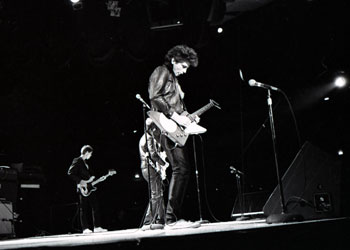
The Eat at New Wave New Years, Sunrise Theatre; photo by Jim Johnson
Jeff: So by the time of New Wave New Year's...
Jimmy: I was accepted as a non-enemy. I was kind of like, "Hey." "Hey. (to somebody else) That's that jerk that takes pictures of the Cichlids."
Jeff: Talk about New Wave New Year's.
Jimmy: That was good. We had a really, really good time, I did.
Jeff: You took some really good pictures.
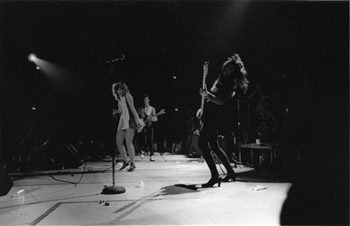
Cichlids at New Wave New Years, Sunrise Theatre; photo by Jim Johnson
Jeff: Do you have one?
Jimmy: I do NOT have one. 96 cents, I believe is what they were selling for, so (with tax) it just evened out to a dollar. And I picked it up 2 or 3 times, and maybe I only had $2, or maybe I didn't have any money at the time, but...I thought, "You know, I should probably get this." I do have God Punishes (The EAT), but...
Jeff: What do you think about the ridiculous prices they're getting now?
Jimmy: It's pretty amazing. There's a lot of stuff that's the same way. There's a lot of bands who...you couldn't give those records away when they were new, and now people are paying 4, 5, $600 for 'em. And a lot of those people weren't even alive then. (laughs) They're just getting on the collector's end of it.
6--CHARLIE PICKETT AND THE EGGS
Jeff: Do you remember the first time you met Charlie?
Jimmy: Yes I do. It was at a Cichlids show in Hollywood, at the Treehouse. And the Z-Cars played that night with them. And Debbie said, "Go in and get Charlie and tell him I need to see him about something." And I said "Who's Charlie?" And she said "You know Charlie." "No I don't." "Well, go over there and find Charlie, he's the tall guy, and tell him that I want to see him." So I went around and I looked for a tall guy. And I said "Are you Charlie?" And he says "Yeah." And I said "Debbie wants to see you over there." He said "Ok." And that was the first time I talked to Charlie, saw him or heard his name. And then later on I found out that he was on the other side of the house, the Dania house on US-1. And I had been to the Dania house...I don't know, 8 or 9 times, and never really met the person who lived on the other side of the house. EXCEPT there was a guy I knew years earlier who lived on Charlie's side of that house. Because when I got instructions on how to come down, I said "Oh my god! This is where Manual lives." Or used to live, this guy. And he lived on Charlie's side of the house. And I guess Robert was on that side of the house, I really don't know. But I thought that was pretty weird, that all those years later I knew somebody who lived in the same weird little house. Which is now GONE, because they widened Sterling Road, and they knocked that house down.
Jeff: And you lived with Charlie later.
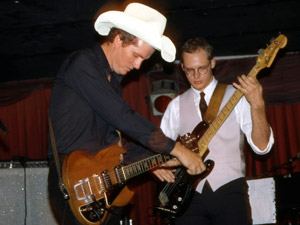
Charlie Pickett, Dave Shibler; photo by Jim Johnson
Jeff: And this was in Hollywood?
Jimmy: No, Ft Lauderdale, right off of US-1 and Broward (Blvd.) But when it goes over US-1 it changes names, and I forgot what it changed to, it was on the water side of US-1. So he said, "Ok, you can move in, everything's cool." So I moved in, and they were there for 2 DAYS. They both moved out, Tak and Donna, I think her name was, if I'm not mistaken. So now I have a house. I paid her $100 when I moved in, then I come to find out the rent for the house was $140.
Jeff: WOW. 3-bedroom?
Jimmy: Yeah. So she was basically living there for nothing plus. And not having ever paid utilities or anything, I didn't know what the city of Fort Lauderdale was sending bills to Donna for. It's like, "Well, It's none of MY business." Well, city of Fort Lauderdale was the water company. And one day when I was in there, and I had just turned the water off, literally out of the shower for one second, there was a guy in the backyard going "Hey!" "Whaddya want?" "Oh, I just turned the water off." I went "Whew! Dodged that bullet!" So I said "Whaddya mean?" He said "Well didn't you get any bills?" And I said "Well there's all this stuff for this other girl." And he goes "Well these are water bills, buddy." And I said "Oh! Ok." So I went down there and had the water turned on in my name. I think, or I just went back and had it turned back on.
Jeff: How long did you live there, and did anybody else live there besides Charlie?
Jimmy: How long did I live there? Less than 2 years. But probably over a full year. And the first person to move in was Bob Rupe.
Jeff: And you guys were friends in high school?
Jimmy: Oh yeah, we were friends all through high school. I met him in like, 1970. It was late '70, like November. But I don't remember much, November 21st, I don't remember. 'Cause I remember we all went to see Savoy Brown at the Hollywood Sportatorium. And they were great. And it was $3, back in those days. So that...kind of solidified our friendship, and we just sort of hung out with all these other guys, Joe, and Bruce, and several other people. So Bob was the first one to move in, and then he moved to New York...I dunno, 6 months later. When the Screaming Sneakers were up there, and they were signed (to a record label), and they needed a bass player, something happened to that guy, so he moved up there. So I needed a roommate, so then Charlie moved in.
Jeff: That was when, 1980?
Jimmy: It was when "The Land That Time Forgot" (compilation) came out.
Jeff: 1982?
Jimmy: Yeah. Anyways, so...we had some music going on in that place.
Jeff: No doubt. You were at the very first Eggs gig.

Early Eggs: Mitch Mestel, Charlie, Barry Seiver
First Eggs gig, late 1980, Premier AOR Club; photo by Jim Johnson
Jeff: You didn't even know he played?
Jimmy: No, much less that he had a band. Or maybe I did, because it seems to me I knew he played guitar because he had that (Gibson) SG. But when he got up to play, he had Debbie's Les Paul (guitar) , which was actually (Debbie's sister) Brenda's Les Paul, come to find out. And I said "Why didn't you play your SG?" He said "'Cause it broke." Literally he was putting the strap on to go through the door to the kitchen at the AOR club, Premier AOR club, and the strap pin came off the guitar. So he picked up Debbie's guitar, and played it. And that was a fun gig. And of course he played, to some people, like me, thoroughly obscure songs. To other people, they'd been listening to them for years. 'Cause he did Velvet Underground songs, I'd never heard 'em. He did Flamin' Groovies songs.
Jeff: Who knows "Cast Iron Arm" by Peanuts Wilson?
Jimmy: Yeah! It's like, I don't know.
Jeff: Not very many people.
Jimmy: Not me, at least.
Jeff: The Flamin' Groovies never really hit over here, they were more a European thing.
Jimmy: No, but I knew their records, 'cause I'd seen 'em, "cause the one guy had the clear (plexiglass) Dan Armstrong guitar (on the cover of the Teenage Head album). Why I never picked it up and bought it is anybody's guess. I knew the Velvet Underground because I had read about them in Hit Parader (magazine), and seen their records, and I knew who Lou Reed was. But I just never became a fan of the band until much later. Like I said earlier, it just all bypassed me. I was listening to the radio, and hanging out with people who listened to the radio. And we didn't do much...exploring, other than that.
Jeff: Talk about Leslie's memory of first seeing Charlie, when everybody else was dressed all 'punk', and Charlie comes out in a dress shirt and dress slacks.
Jimmy: Oh yeah, it was very weird...it was a very different look. Everybody else trying to be...super-hip...or trying to change the look, or whatever they were trying to do. And Charlie coming out in slacks and a button-down long-sleeved shirt. It's like "Oh." And short hair, not greased back, not pompadoured or anything like that, but extremely...straight, almost like a marine. Wasn't quite a crew cut...But then he started to do the thing with the Vitalis, and it grew out a little bit longer, and he "gassed it back", as we used to call it. But he never really got out of the...workin' man's uniform onstage, he never had stage clothes, so to speak. Which was different.
Jeff: So tell me about playing bass for the Eggs at the end of 1981.
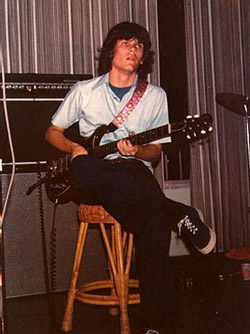
Jimmy onstage for the First Time,
Northeast High School, 1973
Jeff: Were you into blues much before that?
Jimmy: I couldn't play blues, I still can't play blues. I can hide within the structure of blues.(chuckles) But I'm not really a blues-ist. But I fully, fully appreciate the blues. (Eggs guitarist/keyboardist) Bruce (Wismer) and this other guy Jon Rice, we sat backstage with Muddy Waters and Lightnin' Hopkins and Willie Dixon, and all their guys, when I was 20. So they (Bruce and John) were 21, because they were a year older than me. And this was at War Memorial Auditorium in Ft Lauderdale. And we went because we knew who they were, but in between the first and second show, they used to do a show at 6 and then a show at 8:30, or whatever it was. We were talkin' to Willie Dixon, and gettin' his autograph and stuff outside. And the (stage) door was open, and we just walked in with him. Nobody stopped us. There was no laminates, no backstage passes. There was just a bunch of people millin' around back there. So we just followed him into this room, and tried to be invisible. And so we were already back there, and the when they started the second set we stood on the side of the stage and watched 'em. And then when it was over, we went back into this common room, and I was sittin' there in a folding chair, trying not to be seen, and all of a sudden BOOM! Somebody sits down next to me, and he goes, (gravelly, old blues-guy voice) "I done SHIT on that guitar tonight." That's my old guy voice. And I look around, and it's Muddy Waters. And he sat down right next to me, out of all those people in that whole big room, and starts talkin' to me about how bad he played that night. And I'm going, (adopts ridiculous, high-pitched young guy voice)"Well, I dunno, I thought you played really good." I got all twisted up. It's like what do you say?
Jeff: What do you say to a legend?
Jimmy: And as it turns out, the guitar he played belonged to somebody else. His guitar went on some other airplane. So that's what he was referring to, because he had to play somebody else's guitar, and he wasn't used to it, blah blah blah, he was really uncomfortable. But that's all wrapped up in "I done shit on that guitar tonight." So I got to sit there and talk to him, with a box of fried chicken on the table.
Jeff: Alright, very cool story. Now back to your memories of playing bass with the Eggs.
Jimmy: Oh yeah, so that was a real learning process.
Jeff: Was that your first time playing on a stage?
Jimmy: The first time I played with was Joe, Bob, and a guy named Dave Oldman, in high school.
Jeff: That's where that picture is from?
Jimmy: Yeah, where I'm sitting on a stool. Then I didn't play for years. That was 1973, and then I didn't play again until '80. And had a one-off band with Bob on bass, Doug Gilbert was the drummer, he was the drummer for the Roll N Pinz at the time, and Bruce Wismer who was playing guitar and organ, and Sena, who we mentioned earlier, who sang. And me on second guitar. And we did a buncha covers at somebody's house. And that was REALLY FUN. And it was like "Wow, I should really try to do this more." And then the whole bass thing happened.
Jeff: And then the opportunity came up with the Eggs, and you got a chance to do this more.
Jimmy: Yeah. But the first time I played with Charlie, after rehearsing 1 or 2 times, was 2 or 3 songs at the Blue Waters (club in Miami Beach), at some sort of...I'm not sure if it was a benefit or not, but I know a lot of bands just did 2 or 3 songs. And I know we only did 2 or 3 songs, one being If This Is Love, and the other 2 I have no idea. And I do remember feeling very accomplished. I remember walkin' out, goin' "Wow, that was cool!"
And Charlie goes, "So, did ya have fun?" And I went "Yeah man, that was really fun!"
Especially being new to the bass and everything. I don't really know how well I played, to tell you the honest truth, or how many mistakes I made, which was probably a lot.

Jimmy onstage with the Eggs,, Dania Days, 12/6/81; Photo: Eddie O'Brien
Jimmy: Except for that one, Motorbike had the weirdest turnaround, and the funny thing is now I've learned another song that has a similar turnaround. And I said, "I betcha that turnaround from Motorbike came from this other song that shall remain nameless."
Jeff: So, from playing onstage with these guys, did you see that Charlie and Salton and Johnny Stix were gonna take this someplace, that they were that good?
Jimmy: Oh, they were that good. I mean, rehearsing with, and standing in front of Galway live was...semi-indescribable. I don't wanna sound like anything else but the fact that he was a great drummer, but to stand there and hear that come off the drums 2 feet behind ya...is really indescribable. I mean it was...phenomenal. And he also took me aside and...I mean I had a general idea of what the bass was supposed to do, but because of him...he took me aside and he explained in a very peculiar fashion, on how the bass and the drums worked together. (laughs) I remember, he said "'Cause when I'm on the kick drum, man I want you to do this." And he kinda grabbed me and pulled me closer, and then when he did this with his foot, he POUNDED me in the chest with his fist. You know---BOOM-BOOM BOOM-BOOM, "That's how you play." BOOM-BOOM BOOM-BOOM, "When I do this." And he was like, POUNDING me, right? And it was like "Ok, I get ya." OWWWW!! (laughs) But, I remembered that. And I knew that, but to have the sort of reinforcement, of that action, sort of put it into place.
Jeff: 'Cause you didn't want him to pound on you again!
Jimmy: I don't want him to hit me in the chest again, no. (MUCHO HA-HA) However, there was one time, and I have to say, this was a night up in Palm Beach, it was the last night I played with 'em, it was 2 shows, it was that place where they played the New Year's Eve (1981/82) show,
Jeff: The Edge.
Jimmy: The Edge, where Dave Froshnider (who replaced Jim in the Eggs) played, that was his first show, the New Year's Eve show, then they did the Button in January. I didn't know I wasn't gonna play that New Year's show, I thought I was gonna...
Jeff: Tell us how you found out.
Jimmy: On the radio.
Jeff: You found out riding WITH the band.
Jimmy: To rehearsal, and John Salton had a radio show, and he was talkin' to Dave Froshnider on the radio, and said "Oh hey! It's the Eggs' new bass player!" And I leaned up to Charlie and said "What?" And he goes "Oh yeah, well-a, ah..." It's like, "Ok."
Jeff: They forgot to tell you, basically.
Jimmy: Yeah. Apparently he just fit in better, I guess. He could play better, he could sing, he wrote songs. As it turns out, really it was all for the best. I was like "Alright, fine. Well, you coulda told me." It would have been nice. I don't hold it against anybody, it was just fine, because right after that, I started playing with the DT Martyrs. I mean literally within days.
Jeff: Was there any heroin in the picture when you were in the Eggs?
Jimmy: No, absolutely not, it was all quaaludes, quaaludes and weed. Anyway, so back to the Johnny Stix story. Ok, so we're onstage at the Edge, and he's playing (rapidly) tick-tick-tick-tick-tick-tick-tick-tick, and it musta been a song where he knew I had a catch, that I didn't do a turnaround or something, and to get my attention, (laughs) this is pretty gross, to get my attention he hit me on the side of my face, with the BIGGEST LOOGIE you've ever seen. And it just STUCK to the side of my face, and it just went down. And it's like "Oh my god." And I wiped it off, and it was just this big stain on my shirt, and it stunk like you wouldn't believe. And I turned around and looked at him, he goes, whatever it was, "The turnaround, or we're about to stop." Or something. It's like, "Ok." It was just his way of getting my attention, he didn't mean anything by it. But it was like "PLEASE don't do that again." (laughs)
Jeff: And when Frosh got in the band, and started bringing in songs, did you see the band go up to another level?
Jimmy: Yeah. I didn't necessarily think he was a great bass player, I'll tell ya the honest truth. But I did see that he, like a lot of those types of things, it fit. It really did fit with what they were doin'. I'd seen him in the Weasels for...a long time, so I knew who he was. I'm not sure if I really knew him personally or not, but...I knew he existed. Ya know, 'cause his name was Dave Weasel...I had no idea about his real last name for a long time. And probably didn't even know it for a long time after he was in the Eggs.

Live at the Button Cover,
photo by Jim Johnson
Jimmy: Well, Robert and I went down earlier, to take some test shots. And I wanted to get this done, so I wouldn't blow the final thing. Sorta like a dress rehearsal. And Robert and I were takin' pictures, and some guy comes out and, "Hey, whaddya doin'?" "I'm takin' pictures." "You're not allowed to take pictures of this building, it's copyrighted," or something. And it's like, "I don't think so. It's just a Holiday Inn. It's just a bar on the ground floor of a Holiday Inn, you know? I'm just takin' pictures 'cause I'm gonna take pictures of this album cover later on, and I just wanted to get some exposures." "Well you have to get outta here, get outta here! You're not allowed to take pictures!" And he chased us away. For once, I guess Robert didn't talk back. He didn't go "Hey..."
Jeff: "Screw you!"
Jimmy: So we left, but I gotta tell ya, it didn't make any sense at all, to me, for somebody to come out and say you can't take pictures of a public building on the beach. I guess...he didn't want me to take pictures and turn it into a postcard, but I told him it was gonna be for an album cover later on, and it was all cleared...Somebody knew I was gonna do it...something, they knew that Charlie was gonna go in and make an album there, they didn't think he was gonna use a crayon to draw the cover.
Jeff: Yeah, they put "The Button" on the cover in big red letters, free publicity for the club.
Jimmy: Yeah. So then we took the real picture, and Ian Hammond is one of the people (in the crowd in front of the Button). And I used to know who all the people were. Denise, this girl named Denise. Charlie went down to the New Wave Lounge, down the street, and said "Hey! We need some scenesters to hang out down here, so it doesn't just look like a buncha tourists." So we took that picture.
Jeff: Was it before the gig or after?
Jimmy: It was not during the gig. I'm pretty sure it was before.
Jeff: Were you there for all those gigs?
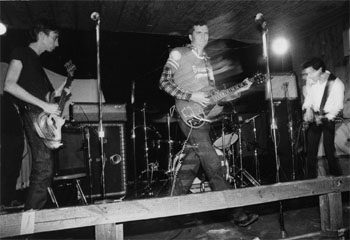
Eggs onstage at the Button, 1/82, photo by Jim Johnson
Jeff: And some of the sets, there was no crowd.
Jimmy: Yeah, there was nobody there. I got a feelin' a LOT of people didn't know it was gonna start that early.
Jeff: I got the idea they intentionally did some of the sets without a crowd. But like you said, they got most of the performances from the first set.
Jimmy: Yeah, as it turns out. I mean, I remember exactly what I was doin', Bob Rupe and I went out to get somethin' to eat. I even remember the restaurant,(laughs) it was a Greek restaurant on US-1 right by where we used to live. And we showed up and they were onstage. And then I remember in between, what I thought was in between the first and second show, which turns out it was between the second and third, Charlie goes "Where the hell were you for the first show?" "I didn't know you were gonna start at 7 o'clock." Who knew? But all in all it was a great evening, both evenings were.
Jeff: Do you think the record has held up over time?
Jimmy: I think they do, except...the one thing about 'em...and it's just me...is that they're not in tune...with anything. (laughs) They just tuned to whoever was closest in tune, and they were thoroughly out of tune, you know? I used to have a variable-pitch turntable, and I was gonna do a couple of songs with Charlie for some reason, I can't remember why, long after playin' with him. And I was gonna go over the songs, and I put the record on, and tuned my bass up to the tuner. And I couldn't find anything that was in tune anywhere. And I had to vari-pitch that turntable ALL the way down to the bottom. And I finally found something that was close enough without actually de-tuning my bass, that I could actually get an idea where that (song) went. That being said, and to answer your question, it's a GREAT representation of what went on at the time. And it's a great record, and...it's pretty classic, it holds up over these years, and people mention it all the time, "Oh, I have Live At The Button."

Tuned Up and Howlin' EP, photo by Jim Johnson
Jeff: And you also took the photo for the Tuned Up And Howlin' import record.
Jimmy: On Jax Pax!(Records) The funny thing was it was right across the street from the Button, they had a gig at the Button. And I took that picture, and in the background, I don't think you can see it on that picture, but if you saw the original print, there's a storm comin' up the beach. You can see the clouds and everything comin' up, and here in Florida you can see the walls of water, come up the beach.
Jeff: And it's windy, it was obviously windy when you took the picture, you can see their wind-blown hair...
Jimmy: Yeah. But those were fun days, good golly...I have no complaints, I'm glad I was there.
Jeff: And how much were you involved with Cowboy Junkie Au-Go-Go, and what did you think of the record?
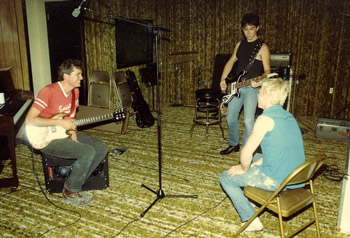
Charlie, Bob Rupe and Johnny Stix in the Studio
Jeff: I had no idea the Bobs were playing on that. I was told it was a Kevin MacIvor song, but...
Jimmy: Well that's what it was, yeah.
Jeff: And later on you met up with Charlie in New York City.
Jimmy: Yeah. They were on tour, and I had my vacation, so I planned to be there the same weekend they were there.
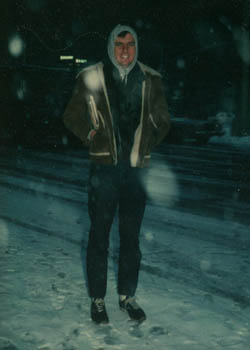
Charlie in NYC, 1984
Jimmy: The (Polaroid) SX-70 (instant camera) picture, which he actually...There was a guy...You know, people do all kindsa stuff for money... There was a guy in New York, and you paid him a dollar, and he'd take your picture. And that's where that came from. He gave some guy a dollar and he took that picture. And fortunately I was able to save it, 'cause god knows where it would've ended up.
Jeff: And was this when they went up there in '84, or was this a different trip, or do you remember?
Jimmy: They were up there for quite a long time. This was during the winter. I was working at the Hollywood Sun-Tattler, and so I try to gauge from those years, and I left in '85, so I was definitely there in '84. So it must've been the '84 trip, yeah.
Jeff: And then how much contact did you maintain during the years following that, when he was getting signed, and touring cross-country?
Jimmy: Well, you know it's funny about that whole time. I remember when the Twin-Tone record came out, we (The Chant) had just moved to Atlanta.
Jeff: That's '86.
Jimmy: Yeah. And Charlie came through with various bands at various times. That's how we met Pat Johnson, because he came through with Pat. And I believe (Bobby) Tak was drumming at the time, and I think Ian (Hammond) was on bass. But I also remember him coming through with another band, in the same van, while I was in the same apartment. With...F Clarke Martty, it was right before the Wilderness album, and John Ross was on bass.
Jeff: What did you think of the Route 33 album?
Jimmy: We thought it was brilliant, because it sounded great. There were songs we never heard before. And it was all well and good...A On Horseback was brilliant. Seka's Wedding was bizarre, with just slide and kettle drum.
Jeff: Moe Tucker.
Jimmy: Moe Tucker. Remember Every Moment is a song that Charlie likes to disown. Remember Every Moment is a song that I'm always trying to get him to revisit, because that's...more or less the kind of stuff that I like, I think. I think they did the right thing, there was the acoustic guitar, and the very tappy drums, everything was real muted and subdued, and it wasn't the normal Charlie, "everything's on 10, and precariously in tune." This was a real well-crafted, it had background vocals, a girl background singer (Lianne Smith). Which is not unheard of, because Debbie and Brenda sang on If This Is Love. But still, she was way up in the mix, all the guitars had great tone, everything was in tune, and it was a great story. And I thought it was brilliant, but he blows it off. Then there's obligatory Mark Markham cover (Meigs County), that was brilliant. Meigs County just right up, just fantastic, revved right up, beautiful. And so I really loved it (the album). It was a great piece of work.
Jeff: Was the Eggs the best band he ever had?
Jimmy: Yeah, maybe. It's kinda one of those funny things where, and I hate to keep saying this, but this is just me, if the Eggs could have ALWAYS played in tune, and could've always been on time, and could've always...done things...in a tighter capacity, I hate to use the word professional because not everybody's professional, and sometimes it works against you. But if there were times that Stix didn't throw down his sticks and say "I'm not gonna play until you bastards learn how to tune." And walk off the stage at the beginning of a set. If there was none of that, MAYBE, maybe something more could've happened. Because if somebody as ridiculous as...this goes against everything that I hold near and dear (laughs), if somebody from a label came to see a show, and they saw that show, what are they gonna say? They're gonna just get up and walk out. So...as rock'n'roll as that is, it's not something that you wanna keep up. So eventually that stopped. But their records were always in tune, were always brilliant, except for the precarious-ness of the live album, but that was LIVE, so we put that aside in it's own category, and say the rough, live rock'n'roll record, recorded the way it should've been recorded, came out the way it should've come out, it's brilliant. So the next step was the Route 33. HAD they been able to stay together and record Route 33, and came out with that band (Pickett/Froshnider/Marco/Stix) that recorded it, the way that...it should've been...it may have done better.
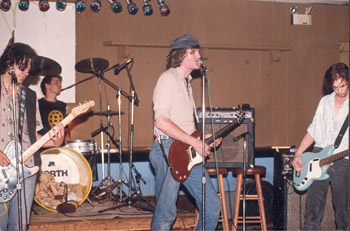
Pat Johnson, Bobby Tak, Charlie, Ian Hammond onstage
Jimmy: Yeah. Those other guys that played the hot-rod guitar, Jim Duckworth is a phenomenal guitar player, and this and that, but he really only came in and tried to fix up something...
Jeff: He was never a member of the band.
Jimmy: No, he came in and just overdubbed those...albeit brilliant parts. But had they just been able to go in as a full band, because those songs that you saved, when you remixed 'em for Bar Band Americanus, WOW! If they could've just been like that as the original band, wow! Who knows? And then the next best thing was The Wilderness (album).
Jeff: Which leads into the next thing I was gonna ask. You mentioned to me that the Wilderness album was mostly Bill Ashton's (Jimmy's partner at Safety Net Records, which co-released the album with Fundamental) doing, but you were at some of the sessions.
Jimmy: Yeah, I was at a great many of the sessions, 'cause I had a very loose job. I could say "I'm not gonna be in, I'm gonna go spend 4 days in Athens with these guys." "Ok, well, see ya later."
Jeff: And you were friends with Pete Buck before that?
Jimmy: Um, I had known him, we were on...remembering-first-name basis, like...(P Buck struggling to remember his name) "Jim Johnson." "Oh yes, that's right." That kinda thing. It was during that whole session, and that whole mix, and that whole thing where I actually became...better friends, where he would now know my name without having to be reminded. That being said, he was the right guy for the record. He did a really great job. And it was...everything went real smooth, there was no real big problems, there was no temper tantrums, there was...nothin', nothin' like that went on. Um...they did a really good job with what they had, especially with the comin' in of, pretty much 2 different bands (actually just 2 different bass players). And he (Buck) got along really, really well with everybody, and they did that great show, where REM opened for them under one of their fake names, right before the (REM) Document record. And they were just brilliant. The only thing I could do was say "Well, this must've been what it was like when they played the Uptown Lounge for a dollar, and there was 35 people (there)" There was more than 35 people (when they opened for Pickett), but this must've been what it was like. Where they just...it was just the 4 of them, and they just turned it up and they let it fly, and they were REALLY, really fantastic. 'Cause all I had seen was the bigger shows, they weren't giant by that time, but they were still bigger than (playing) clubs.
Jeff: And how were the MC3 that night?
Jimmy: They were great too. And then Pete got up and played a coupla songs (with Charlie), and then I came up and got in the way of the last song (laughs). And Jill (Kahn) took this picture that you can see me in the back, and Charlie and John Ross and Peter. And it's a real great memory.
Jeff: And you still keep up with Peter Buck.
Jimmy: Yeah, I just saw him. But I don't keep up with him privately, I just saw him play at the Earl. Super, super guy. I can't say enough about him. From my experiences of hanging out with him..."It's late, why don't you spend the night."..."We're all gonna go out and eat, I'll buy." All this kinda stuff. It's like, "Well, you don't have to buy my dinner." He goes "It doesn't matter." "I don't have to spend the night, I'll go home." "No, spend the night, it's late." You know, this type of thing.
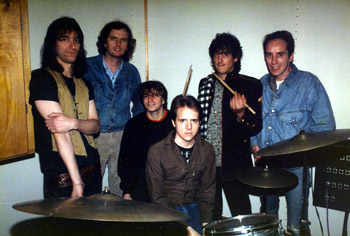
(L-R) Pete Buck, Charlie Pickett, Clarke Martty, John Keane, John Salton,
John Ross. John Keane Studio, Athens, GA. 1987
Jeff: Were you aware that Pete offered to pay so that Charlie could finish the Wilderness album?
Jimmy: No, but I was aware that I lent Charlie $2000 to pay...(cracks up laughing)
Jeff: See, I didn't know that either.
Jimmy: Yeah. And (it was) paid back immediately. (slaps hands together quickly) If not sooner.
Jeff: Charlie went back down to Miami and worked, and then came back and finished the album.
Jimmy: Yeah. And somewhere along the line, I got a check. And (I was) glad to do it, did it without hesitation. Because...just KNOWING that this was a record that needed to be made. It wasn't like, "Ok, this is gonna come out and it's gonna fail. Or it's never gonna come out, and I'm never gonna see a dime of this."
'Cause Charlie said "Can I borrow some money to fix this record? I'll pay ya back." Good enough for me. (I) Won't do that with everybody.
And I did it with another band too. Boom! "How much? How much do you need?...Do I have it?...Here it is. Will I get it back?" "Yes." Did I get it back? Yes. Another great record, a record you can't live without. (laughs)
Jeff: (The Bobs') White Gazebo, right?
Jimmy: No...(The Silos) Cuba.
Jeff: Oh! I didn't know that. Any idea of how many copies of The Wilderness were pressed and/or sold?
Jimmy: None whatsoever.
Jeff: And it was on CD also.
Jimmy: It was the first Safety Net/local band that I had ever had anything to do with on a CD. But I believe the only reason that happened was that it really wasn't...it really didn't come out, as far as I know, and I apologize for not knowing, Bill Ashton is the person to ask. From what I understand, this was a Fundamental (Records) project, but it shared the Safety Net name because he (Bill) was involved. So that's why it says Fundamental/Safety Net. And that's the reason why, I think, that it came out on CD, 'cause they had the money to make CDs.
Jeff: And thank god they did, because that's the only way we have the Cowboy Junkie stuff in any kind of quality. As far as I know, the master tapes are long gone.
Jimmy: As far as ANYBODY knows the master tapes are long gone. They just weren't taken care of after that. And nobody knows...I certainly don't, because I had nothin' to do with it. And then I have tapes that are missing that I had something to do with too, so you know, I'm not perfect, nobody is, but...things just go missing after a great amount of time. It's awful.
Jeff: And then after The Wilderness came out, Charlie did one more tour, and then called it quits, and went back to school.
Jimmy: Yeah, apparently.
Jeff: Did you talk to him about that? What were your thoughts?
Jimmy: I said "Well...whatever you need to do." Because I stopped playing at some point too, given certain circumstances. And there's been times when I wanna quit also, and I know other people who are still playing by the skin of their teeth, which is the way I like to put it. (laughs)
Jeff: The way Charlie put it was he didn't wanna end up working at Publix, and giving guitar lessons on the side.
Jimmy: Exactly! Because he had more...he had more goin'...He just saw the light at the end of the tunnel. And at the time it was a good thing for him to stop, and go back to school, because a) he met Penny (Charlie's wife)...so...
Jeff: Right...no-brainer there.
Jimmy: No-brainer there, that's...for any other reason, it was meant to be. And it's ok for him to play like he does, with whoever's around, to go out and play.
Jeff: And maybe Charlie will get to play Atlanta again.
Jimmy: Maybe. So that is in the laps of the gods, and the hands of somebody else, as the old saying goes.
Jeff: And you were the first one that was contacted by Bloodshot Records, for what ended up 10 years later being Bar Band Americanus. And you brought myself and Karen into the project. Are you happy with the way it came out?
Jimmy: Yes, because it was finally done! I think I would've been happy with it if it had sounded like a third-generation dubbed cassette, 'cause like "Finally! It's out!"
Jeff: Do you think it stands up as the recording that he's gonna be remembered by?
Jimmy: I think really...the funny thing is that most people who know who Charlie is, they immediately say Live At The Button. And I think that Live At The Button is going to be the cornerstone record of Charlie's career.
Jeff: Even if it never comes out again?
Jimmy: Even if it never comes out again. Even if people have to pay $150 on ebay.
Jeff: Really?
Jimmy: Because that is not any conclusion that I came to on my own. I came to the conclusion because people say, "Charlie Pickett? Oh, Live At The Button." It's like one sentence, it's like his last name. It's like Charlie Pickett Live At The Button. Its his last name, Live At The Button. And that's what people always, always say. Or If This Is Love, they remember If This Is Love, from any of the versions. I think Bar Band Americanus is a great representation of all those things, I think (Bloodshot Records' honcho) Rob did a good job of wanting to represent all the different eras. I DO think, and I'm not alone in thinking, that Live At The Button should come out, on it's own, as it's own CD. Now, you don't have to make it a 5.1...remastered...thing, because it's gonna sound worse than...If ya just make it sound good...
Jeff: Yeah. Bob Rupe already did the transfer, and he did a great job.
Jimmy: Yeah, just transfer the tape, make it sound good, and put it out. And quite frankly, I would have to say, no bonus tracks. Even though it's 29 1/2 minutes or 32 minutes long, or whatever it is. Because once you start getting it into that, then you have to start to re-think everything else.
Jeff: Yeah, I see that. Charlie shares your opinion too.
Jimmy: And you just go "This is it, beginning to end, this is the way it came out, this is what got the press, this is what people bought, this is what people liked, here it is, buy it or don't."...ya know?...And there you have it. And I really think it needs to come out on it's own.
(if you disagree, and want bonus tracks, e-mail us at Trashfever)
Jeff: And I disagree, but it's ok. And barring any problems, I hope to see Live At The Button available somewhere other than ebay and GEMM, sometime in the not-too-distant future.
Jimmy: Well there's not gonna be any problem, because there's no reason for there to have a problem. It's way, way off in the past, and it's not like it made somebody millions of dollars, and you're stealing their intellectual property. Because, as far as Open (Records) went, they put it out, it ran it's course, and they moved on, and it's done. Open doesn't exist anymore, it's not like it's something in their back catalog that they're keeping alive. Open doesn't exist, there is no back catalog. They may disagree with me, and I don't mean...
7--THE CHANT
...It's the same with Safety Net, Safety Net's not alive. The back catalog doesn't exist, but there are records that do exist that are still sitting in boxes on the floor, or on a shelf.
Jeff: We'll do a Safety Net BOX SET!!! (laughs)
Jimmy: Well, there's a problem with that. It's been talked about between Walter (Cz), Bill, and myself. But there's other people that need to be considered. Musicians, songwriters, and so forth and so on. Some don't think it should be issued in any way, shape or form. Some do.
Jeff: Wanna say who?
Jimmy: No. And the only thing that I can speak about is, Walter and I still discuss our 2 Chant records, which people still have some vague memory of. (laughs) I would love to see both of those records out and alive, separately. You know, the Safety Net/DB (Records) thing was great, when they put it together (both Chant records appeared on one CD in the '90s), but one song had to be taken off the first record because of the 73 minute deal (maximum length for a CD). And it was 2 minutes over with a 3 minute song. And there was nothing you could do. And we had to make that decision AT the mastering plant, Bill and I were in Nashville, at the mastering plant, talking with Walter on the phone. And said "You gotta make a decision, it's pretty much between this song and this song." And he made the decision. To me it didn't matter, something had to go.
Jeff: And which was the one that ended up going?
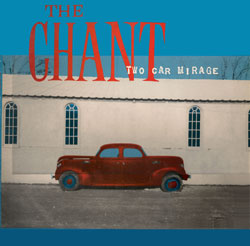
Jeff: But we gotta get the tapes transferred first.

Jeff: And you've mentioned the echo that's put on LPs as opposed to CDs.
Jimmy: Yeah, that was something that you had to do, you had to over-reverb records when they went to vinyl, 'cause the vinyl ate it up. This, of course, is a discussion for Bob (Rupe), and anybody who actually knows how to master records. So when you do listen to this record on the CD, it is a little...there is like, "Gee, I wish I could get rid of that." And I can't remember if it was printed on the takes, or if it was added in between the multi-track (tapes) and the master (tape). So maybe the multi-tracks are dry (without reverb), and it was just in between the 2. I really don't know. But after all these years of listening to it, since '91, listening to it this way, that all that kinda thing has now gone away, and it doesn't (bother him). But if you listen to Small House on the CD, you can hear where the leader tape stops, and where the song starts, but it doesn't actually start. You just hear this...this room sound. And it's kind of...I wouldn't say annoying, or disturbing, but...you kinda look around and go "What was that?" 'Cause usually from the tape that separates the songs, it goes right into the song, you don't hear anything. And this, now there's something, it's like "What is that?" And what it is is the amps hummin'.
Jeff: Buzzing.
Jimmy: Yeah, because when we did Small House, it evolved to where Walter would do feedback at the beginning with his guitar. Well, in the studio, we took that to another level, and we just turned everything up all the way, and I had a guitar and he had a guitar. And I don't know if Rich had a guitar, I can't remember.
Jeff: But there was at least 2 of you doing full-on feedback...
Jimmy: ...And it was FULL UP. And that's what that noise is, it's the amps goin' "BRRRGGHHHH". And then all of a sudden he (Walter) goes "WHHHHHHHRRRRRRR" (laughs). But to me...that's what makes it. Some people would go back and edit that out. And say "Well, we're just gonna fade it up with the feedback, and we're gonna take that (out), because it's disturbing."
Jeff: Right. It's SUPPOSED to be disturbing.
Jimmy: Well to me, that's the beginning of the song.
Jeff: It's the start of the song. You got a little room noise right before the start of a song, 9 out of 10 people ain't gonna notice it anyway.
Jimmy: Yeah. And Walter starts off this one song, instead of counting it he clicks it on the guitar. And it sounds great. It's the beginning of the song. And it always was, and it always will be. But when I was in the Vidalias up in Atlanta, and we had the beginning of a song that was much like that, and we left it in the hands of the engineer to mix it, they cut it out. And I think it was a hi-hat (cymbal) thing, I think it was something that was done on the hi-hat. And the song's great, but you know what? It's like, "What happened?" "Oh, I cut that out, that was like a count-in, wasn't it?" "Well no, it's the beginning of the song."
Jeff: So there's people that will go for perfection, and there's people that will go for feel, and you'll go for feel.
Jimmy: Every time. Yeah. But we could've...if you look back on either of those (Chant) records, "Maybe we can do this guitar track again, or maybe we could do this again, or maybe we can get 2 other people to sing back-up, 'cause it'll tighten it up, and it won't seem so empty, and blah blah blah." And it's like "Nah." It is what it is, 'cause it was...25, 26, 27 years ago, whatever it was. And it's just gonna stay that way.
Jeff: Charlie has spoken about the spacing, knowing what to play and what not to play, referring to the Chant. And that it was different then the Essentials in-your-face punk rock, there was more twists in the lyrics, there was more twists in the music...There was more space...
Jimmy: Yeah, it was refined. Well, it just comes from...experience. Even the Ramones, as in-you-face as they were all the way up to the end, there is a definite...you can definitely notice the way the songwriting and the playing, refined from the very beginning to the very end. And it's the same with anybody who has an idea. You listen to songs on the Chant's first record, and even the second record, so you're going from late 1984, when we started runnin' tracks in December '84, I think. And finishing it up, and when we started (Three Car Mirage) in '88 at John Keane's, and did those first 3 songs...or 4 songs...or 6 songs. (laughs) It doesn't matter...4-5 songs. Then, a year later, when we did it later in Atlanta, it's definitely not seamless. But it's not like the first record and the second. But the songwriting really moved up, from the first record to the second record. And the songwriting really moved up from the first part of the second record to the second part of the second record. And of course...if it didn't, you're in trouble. And all these other different things happened, all very small...little things that went on, but...those are the kinda things, you have to move on, you have to move up. But I'm really happy with everything, Chant-wise. There's a lot of people that say "Oh, I don't like anything I did, oh that was the '80s, oh that really sucked." It's like, "Sorry." It was really the first thing I did, it was really the first song I...the first song that I really wrote ended up being co-written with Walter, which was 7:20. And I don't look back and go, "Oh, it's the first song I wrote, it's HORRIBLE!" You know? To me it's not, maybe to somebody else it is, but I don't have any bad feelings about it.
Jeff: Talk about your relationship with Walter, you guys are still good friends to this day.
Jimmy: Oh yeah!
Jeff: Did you first meet him when he was in the Essentials?
Jimmy: He was in the Essentials, really, really early on, and we met at Open, the one at Progresso Plaza. I've forgotten exactly how or why we met, but it was also one of those things where, "Oh, I have a band and you take pictures?" "Yeah I do." "Can you take our picture?" "Ok." So I took their Essentials EP cover.
Jeff: And you said you weren't involved in Safety Net at that point, that was just Bill and Walter?
Jimmy: Yeah. And Bill started Safety Net to have a name for a label, to put Walter's record out. So they did that, and I took the pictures, and (was) glad to do it.
Jeff: And Charlie produced it.
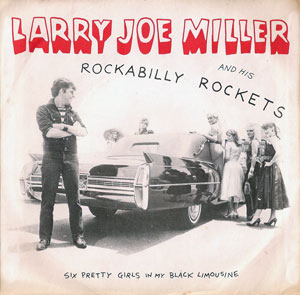
Larry Joe Miller 7", 1983
Jimmy: Charlie produced it, and I had taken pictures for Charlie's singles. I had one picture on both singles. Although, again, they were both on the back, but glad to do it. But then I got the grand slam, which was the cover of the Button record. And...that's where it ends. "I did the cover of the Button record, no more!" Walter's Essentials was the first cover I got, but I have a pretty good collection of (cover shots)...the Cichlids, Charlie, the Essentials, Larry Joe Miller's Six Pretty Girls In A Black Limousine, the cover of the EAT cassette...
Jeff: Pretty good portfolio.
Jimmy: Yeah, I'd say.
8--THE DT MARTYRS
Jeff: We'll come back to the Chant, but I wanna talk about the DT Martyrs.
Jimmy: Oh yeah, we missed them completely.
Jeff: After you left the Eggs you immediately started up with the DT Martyrs.
Jimmy: I immediately, almost immediately started up with the DT Martyrs.
Jeff: You replaced Pete Moss on bass, is that correct?
Jimmy: I do not know.
Jeff: I believe you did. I think Ian said that.
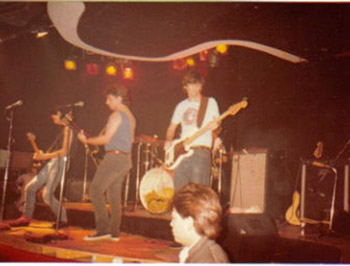
Jimmy with The DT Martyrs at Flynns, Miami
Jeff: How closely did you know these guys before this?
Jimmy: Um, fairly. We weren't best friends or anything, but I certainly knew who they were, because I hung around Rusty when he was in the RAF. And to tell you the honest truth, as it goes, sadly, there's some brain cells missing...I knew Al Harmon then, but I don't remember where or how I met him. And I'm sorry, I apologize fully (laughs), I apologize to Al. But I do know that I did know him, and we did have this conversation, and...
Jeff: And you started rehearsing with them right away?
Jimmy: Pretty much. It's like, "Who's gonna drum?" "Doug Gilbert's gonna drum. He was in the Roll N Pinz." "I remember Doug from the Roll N Pinz, yeah. Ok." So that's how I got involved with them. Not knowing if it's the Martyrs Mach 2 or not, I just know that...that's how I got involved. And it was not too outside the box of what Charlie was doing, but only...I wouldn't say but only different, but not on the same exact railroad track. You know what I mean?
Jeff: Yeah, blues-rock with a LITTLE bit more punk rock put in.
Jimmy: Yeah, with a little bit more...
Jeff: Maybe just a little. But it was still blues-rock.
Jimmy: Yeah, yeah, exactly. And I also remember somebody saying, "Oh yeah, the DT Martyrs, they're like the little Eggs." You know, like the Eggs wannabe. Which I didn't think was really quite fair. But if somebody was to see it from the outside, they might see a similarity between the 2 bands, and knowing that Charlie was there first, ok, I can understand that, but I'm still not gonna give 'em any leeway on that...
Jeff: The only people I would accept that from is the people who knew Ian well enough to know that he worshipped the ground that Charlie...kicked his leg on. You know, the little leg-hop he does...(I attempt to emulate Charlie's single-leg hop, with very limited success. Jimmy laughs)
Jimmy: I did that once in Atlanta when I was playin', and I hurt my foot for a LONG time. I stopped doin' it.
Jeff: So you played with the Martyrs for almost 2 years. How often were you playing out?
Jimmy: Maybe once a month.
Jeff: And did you practice every week?
Jimmy: Yeah, that was a given.
Jeff: Were you writing songs by then?
Jimmy: I had written a song called Lookin'.
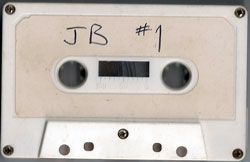
Jukebox cassette compilation, Jeterboy Records
Jimmy: Joe Imperato, my friend who lives in Miami.
Jeff: Talk about how that came about, and how it got on Jeterboy's cassette.
Jimmy: We did it at his house, Joe was the first of a bunch of us to have a 4-track cassette (recorder). And he was really the first of a bunch of us high school friends to really write his own stuff, and play every instrument. So I said "Well I have something, I have a riff." And so I went over to his house, and we went to dinner. And we went back to his place and we put the song together. And it was the first song that I really wrote.
Jeff: What do you think of it now?
Jimmy: Well, I look back and I don't really cringe, in the fact that...I think, in this aspect...it would...a whole new recording experience would be better then the way that it happened on the cassette. And perhaps some tweaking of the words. Uhhhh....but it is not...I haven't really ejected it from my ideas.
Jeff: It's a pretty good effort for your first song.
Jimmy: Yeah, it wasn't bad. And I like the fact that we put the bass through a fuzz-tone...it was on my Mustang, I used my Mustang.
Jeff: Was it something that you had worked on previously, or did you just have the riff, and that's all?
Jimmy: Yeah that's all. I had a few words, but no chorus, and Joe put the part that goes (sings) "Lookin' for someone." But those were his chords, E, F sharp, G, and A, I think. And so we put that together and it was pretty good, I was pretty excited about (it). I finally actually had something that I had done. Everybody else was doin' it, I needed to get in on it.
Jeff: Did you bring any songs to the Martyrs?
Jimmy: Yes, Lookin'. As a matter of fact, we did a really great version of that. And Doug Gilbert was the only guy who ever played the drums to that correctly. I can't get anybody to play it the way...like "Play it like..." and choochoochoochoo (drum pattern sound), and "Well, that's good, but that's not how it goes." It goes kind of like this. So I never really fully fleshed it out, so I never really tried too, too hard. But it never worked in any other band I was in.
Jeff: Any memorable gigs that you remember when you were in the Martyrs?
Jimmy: Well, a couple of shows at Flynnís. The last show I remember pretty well, it's too bad it was the last one. A couple of shows at Flynnís...ummm...actually we really only played Flynnís and, there was a place way out, way, way out in Miami, and we played it with...I think we played it with the EAT, 'cause it's on one of those flyers. What is that place called? (Big Daddy's Blitz) I can't remember. We played with the EAT that night. We didn't play really many other places besides them, we played Sync Studio Z, a couple of times, my first show was there, and I think we played there again. We never played the Agora, we never played the Button, we never played...from what I remember, you can ask Ian. But from what I remember, the great majority of our shows were at Flynnís, or anyplace that Richard Shelter booked.
Jeff: And those demos you did with the Martyrs, were those done at Sync?
Jimmy: They were done at Sync, yeah.
Jeff: And why did you leave the band?
Jimmy: 'Cause I started to play with the Chant. And I started to play with Walter, at the time, it wasn't really anything for people to be in 2 if not 3 bands.
Jeff: Yeah, Salton was in multiple bands.
Jimmy: So was Galway.
Jeff: Yeah, Charlie played in Morbid Opera.
Jimmy: So I just started playing with both bands, well...I don't know how to put this. We (the Chant) started playin', and the Chant actually started to gain some notice. It became a problem.
Jeff: So you had to make a choice.
Jimmy: Yeah. And if somebody comes up and says "You're either gonna play with us or with them, and you have to decide right now." in a rather inflammatory way. "See ya."
Jeff: Your overall experience with that band, fond memories?
Jimmy: Yeah. A couple of pretty shitty shows, but everybody has that. Outside of that, it was a great...I think some of the songs we did, and then of course, as ridiculously stupid as I am, like with Charlie, and like the Cichlids, and even the Screaming Sneakers, I had no idea some of the songs they were doin' were covers. I had no idea some of the songs WE were doin' were covers either, because I had never heard them. And it's like "Oh, we're gonna do this song, here's how it goes." Nobody said "Oh, this is a Bob Dylan song." Well, Bob Dylan's wrote 85,000 songs, I never heard 'Odds And Ends'. It never occurred to me...I LATER found out it was a Bob Dylan song. But it wasn't like Al said "We're gonna learn this Bob Dylan song." It was like, "Oh, we're gonna do this song, and I'm singin'." "Oh ok. That's a pretty good song!" (laughs) THEN I found out it's a Bob Dylan song. But we had WAY more than enough to do a good record with that version of the band. And we did do demos, we cut 4 songs, one being (the Velvet Underground's) "What Goes On", which we actually did finish, there's actually a finished master of that song. The other ones, Al and Ian decided they weren't worth finishing. So they just moved on, and they never finished them.
Jeff: Ok, and when you started working with Walter, was it initially just you and Walter?
Jimmy: Initially Walter and Bill moved out to Los Angeles.
Jeff: Yeah, what's the story behind that? The Essentials move out to L.A., it doesn't work out, the band falls apart...
Jimmy: Right, Pete Moss left them at a gig, him (Walter) and Henry Sierra, left them at a gig, and flew home and didn't tell anybody. They're just sittin' around wonderin' where the hell Pete Moss is. Walter was already into a lot of that Paisley Underground jam-type things.
Jeff: Yeah (getting it backwards) Walter was already doing Chant songs at the last Essentials gigs.
Jimmy: Yeah, well we started doin' Essentials songs because they were already written.
Jeff: He was moving in that direction already, at the end of the Essentials.
Jimmy: Yeah, but...it all just felt...I think it was more on the same page for me also, that kinda stuff, then what we were doin' in the Martyrs. It's not that it was bad, and it's not that I didn't like it, it was great, it was fun, I really enjoyed it. But this seemed like..."Oh, this is less...less effort, to try to make it sound good." There wasn't as much effort in it for me, because it seemed like this was really...what I was gonna end up playing. And I had already cut my teeth on a LOT of that stuff...when I listen back to those (Martyrs) demos, and that live stuff, I couldn't believe what I was playing on bass back then. I never even THINK of playing that today. It's like "Oh my god! I can't believe that I played SO much." So you learn, it's a whole big learning thing...
Jeff: There's no instruction manual.
Jimmy: No. And it was, I thought, really good and really creative. And without the step of the DT Martyrs, I wouldn't have been able to continue on with the Chant, so certainly the DT Martyrs was a good thing for me. And I'm just sorry it ended the way it did, sour...
Jeff: And with not that much recording.
Jimmy: Yeah, I'm really sorry we didn't finish a whole record. Finished, from beginning to end, and put it out as the DT Martyrs with Rusty, as he was known, Al, Doug, and myself. 'Cause we did have a full record. And it would've been great, it would've been a really great snapshot of...but it didn't happen, so...
9--THE CHANT 2
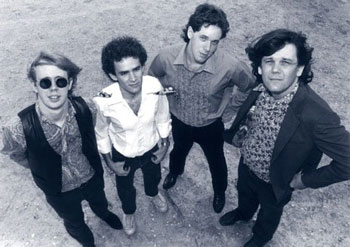
The Chant
Jimmy: Walter came back from Los Angeles after that whole thing fell apart, he says "I really want to try to keep this thinking." He didn't wanna copy it, 'cause no one's really the Long Ryders, are they? Or the Plimsouls, or any of those other bands, 'cause they already exist. But if you have the same mindset, and you come on the same page, you can work it out. And of course, the first time you pick up a 12-string (guitar) in the early '80s, they're like "Oh, they sound like REM." And the great thing is that, we had a review where it's like, "The REM-style Rickenbacker chiming of Walter Czachowski..." And it's like well, for one thing, it's an Ovation, it's not a Rickenbacker, not every 12-string's a Rickenbacker. And not everybody who plays a 12-string is REM.
Jeff: Walter's playing doesn't sound like Pete Buck to me.
Jimmy: Yeah, but to a reviewer who wants to sound like he's in the know...he'll just mention that because..."Oh, this guy plays a 12-string, so this guy must play just like him." But again, nothing against Peter, he's a fabulous innovator, one of the best of this...of ALL time, I would think. And so we use those as a...'cause Walter played those songs on the 12-string before I heard 'em, so...it was great! He put an ad out, and Todd Barry (first Chant drummer) called. And I'm trying to think how Mike (Patterson, first Chant guitarist) came around, you're gonna have to ask Walter...or Mike...It seems to me that we rehearsed at Musicians Exchange with just the 3 of us the first time. And Todd showed up with a beard. And we just went...(whispers) "No beards allowed! How we gonna tell this guy to shave his beard? He's fittin' in really well, we really like him." But...first time for Todd to hear this...we don't like his beard. "What are we gonna do?" "I don't know." We don't know what to do, because none of us has ever had to do that before. So it's like "Ok, let's just wait and see what happens. I guess it's really not gonna matter." So the next time he shows up, (the beard is) gone. Problem solved (laughs).
Jeff: How long were you together, how many gigs did you do before you started recording? It seems like you started recording relatively quickly...
Jimmy: It was relatively quickly, but we still got a lot of gigs under our belt. We got booked fairly often, again, like the Martyrs, we had a pretty stringent rehearsal...we rehearsed a LOT, I mean a lot. At least once a week, and I think if it was less than once a week, it had to be for a really good reason. (laughs) It wasn't because the World Series was on. It was because somebody went out of town, or something happened. We really, really worked hard, and it began to show. So we were really tight when we first played, and we were all on the same page, and it was very exciting. And I was still playing with the Martyrs at that time too.
Jeff: Probably made things easier when you went into the studio too, being well-rehearsed.
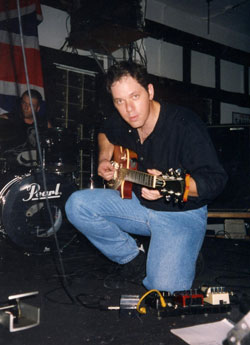
Rich DeFinis
Jeff: Yeah, what's your version of that?
Jimmy: My version of that is that he called and said he was leaving the band. I have no version.
Jeff: Ok, you didn't hear any of his complaints?
Jimmy: I heard all the complaints second-hand, from Walter and from other people, or whatever he told Walter. And I don't wanna mis-quote, especially mis-quote Walter. But from what I remember from any number of different people, he said something like "I don't wanna be on a record with chicks and tambourines."
Jeff: Right, and 20 years later, he told me pretty much the exact same thing on the phone.
Jimmy: Oh, then that's true, ok.
Jeff: He expounded on it a little bit, but that's what it came down to. But you didn't hear any of that at the time.
Jimmy: No, he just called and said "See ya." It's like "Ok, whatever." (laughs) It's not up to me. So we went in and we started Three Sheets To The Wind. There's several songs where it's just the 3 of us. And I was talking (later) to Rich on the phone, and I said "Did you play on Jonesboro? 'Cause I don't remember you playing on Jonesboro." And he goes "Oh yeah, I played on Jonesboro." I said "Oh, ok." I just don't remember. And I believe Small House was a song that he was not on. Because that's why I played the feedback guitar. That's why I fleshed it out with a second feedback guitar. And maybe Drive Away...you'd have to ask Walter. And maybe there were some songs that we did the basic tracks for, and he came in and overdubbed, I can't remember. There's a lot of stuff I don't remember because I wasn't there for all the sessions. And they weren't there for all the sessions for me either, because I went in and cleaned up some bass, by myself.
Jeff: It was just 'as schedule permits', because you all had day jobs, right?
Jimmy: Yeah. And I went in and did the ebow again on Drive Away, and Bob. (Bob Rupe produced Three Sheets To The Wind with the band) You know, working with Bob was fun because we...being friends, and also, he wasn't afraid to do something ridiculous just for the sake of doin' it. But...you're familiar with the sound of an ebow? It's just one sound. It doesn't do anything else, it's just how you manipulate it. Well, you can actually make it sound backwards, if you knew how to do that. If you did something the right way, it sounded like you were playing the lead backwards. Well, because this wasn't really a lead, so much as a (single-note) line, we turned the tape over, and recorded it backwards. And when you turned it around and played it forwards, there was no difference. (laughs) It doesn't sound like it's backwards! It was just to do it, it was just our thing.
Jeff: And that's the way it ended up on the record.
Jimmy: That's the way it is on the record.
Jeff: And it doesn't sound backwards.
Jimmy: It does not sound backwards, because it sounds backwards anyway. There's one little part at the tag where it fades out, where it goes (high guitar notes) "neenooneenoo" really fast, and maybe or maybe not you can say that sounds funny. But it all sounds funny with an ebow. And we just did it...just because we could, and because it was stupid, and I remember laughing all the way through it, going "Why are we doing this?" "Because we CAN." But it wasn't like his ebow line on Jonesboro, Bob's line, it was brilliant.
Jeff: Bob Rupe played ebow on Jonesboro?
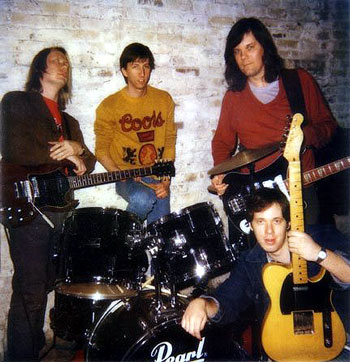
The Chant-Walter, Frank, Jim, Rich
In my mind, I think everyone should know the time line of the band and whom played when and where...this, of course is not true. I have to say Rich Definis was as much a part of the Chant as anyone. He moved from home to be up here. He poured his heart and soul in to playing incredible guitar parts. The wah-wah stuff on "Through My Eyes" was beyond the greatest wah-wah parts ever recorded.
10--SAFETY NET RECORDS
Jeff: Safety Net had put out 4 records by then?
Jimmy: I think it was, this was the fourth record. The Essentials, the 2 Bobs records.
Jeff: Don't forget Nouveau Reach.
Jimmy: Thank you, right.
Jeff: So besides playing in the band and being on the record, how much were you involved with Safety Net at this point?

The Bobs first EP, Safety Net Records 1983
Jeff: So they (Open Records) had almost gotten to the point of making the records, they had the lacquers pressed and everything?
Jimmy: They cut the lacquers, yeah. And for those who don't know what lacquers are, look it up.
Jeff: It's the master copy of the record that you use to press the actual vinyl.
Jimmy: Right. That's what they make the stampers from (that stamps the grooves on the vinyl). If you don't remember what records are, look it up (laughs). So they were under Kevin MacIvor's sink. Or not actually under his sink, but the counter area where the sink was, they were maybe in the next section. We went and picked 'em up, which is why, if you have one of those, it has a Safety Net label but an Open matrix code on the vinyl. So we went and took 'em to a guy down in Plantation, not too far from here as a matter of fact, and the guy pressed 'em up, and we made...I think 300.
Jeff: And that's all, there was never a re-press?
Jimmy: No.
Jeff: Didja sell 'em all?
Jimmy: Nope. Very few sold.
Jeff: How many do you have?
Jimmy: Well, they've just disappeared over the years, they've gotten warped. We had a bunch of 'em warped because of (improper) storage. God knows where they all are, I know I have a handful, but...A lot of record stores back at the time were...Well, just take 'em on consignment, you bring 5 in, and they write you a thing, and then you bring it back, and "Oh, we have to look up uhh...We don't know if they've sold." "Well they're not on the shelf." "Well that doesn't mean they've sold, that means maybe we took 'em off for shelf space because they didn't sell, they're in the back. So we have to either find them, or find out from our records if they've sold, and that's gonna take time." So you never find out if they still have the records, so you never get paid. So records just disappear all over the place. The only records that you did know that sold were the distributors who actually pay you, and it was...we sold very few through a distributor.
Jeff: I've heard stories about indie labels back then, where the only way you could get paid for a previous record, was to have a new record that they wanted, and then they would pay you what you were owed.
Jimmy: Oh really? See these are all the things that you run into with this kinda thing. This was put out, just simply because this record NEEDED to be put out, and now that Bob and Kevin were playing again with Galway...they started playing again, and they got pretty popular, so we made a second record.

The Bobs White Gazebo EP, Safety Net Records 1984
Jimmy: (pause) Uh...I think we did 1000, 2 500 runs, maybe. Or maybe the first 500, and then 300. I think it was one of those mistakes where it looked like it was selling really well, so you made more before it sold out. And then it stopped (selling). And then again, the same thing, warpage, disappearing...pilfering. "Give me 10 records, I'm on it, but I don't wanna pay for it." "Ok, here's 10 records." "Gimme 10 more." "Oh, here's 10 more." "I need one for my sister." "Ok, here's another one." And then they just all disappeared, one way or another.
11--THE CHANT 3
Jeff: Three Sheets To The Wind.
Jimmy: Yeah.
Jeff: How long from the start of recording to the record actually coming out?
Jimmy: Really quick.
Jeff: How many were pressed?
Jimmy: I think we pressed 1000 right off. And they evaporated. Probably not as fast as that, but if you could slow it down, it's like "Ewwwwwww" (sorta like the air being let out of a balloon).
Jeff: And you pressed more?
Jimmy: Yep.
Jeff: So a total of 2000?
Jimmy: I think we did 3000.
Jeff: And Todd Barry is now a stand-up comedian. Why did he leave the band?
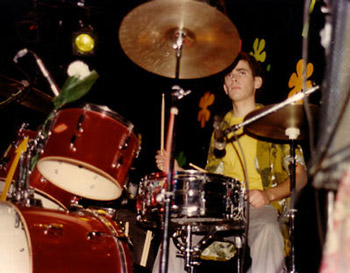
Todd Barry onstage at Flynns; Photo: Jim Johnson
Jeff: He probably didn't either.
Jimmy: Maybe, I really don't know. You'd have to ask him. He went to school in Gainesville, I remember we tried to book a coupla dates out of town, and he says "I can't go." "Why?" "Because I'm going back to school." "When?" "Tomorrow." Or some kinda timeline like that, next week. And it's like "Really?" So, he left. And it's like "Oh no, what're we gonna do?" "Move to Atlanta." "Ok, see ya." Because Walter's then girlfriend Teresa, and our friend Jeanette, who sang on the record and we were friends with...
Jeff: The offending female vocalist and tambourine player, according to Mike.
Jimmy: According to Mike, yes. And so they moved to Atlanta, because I think Teresa, had the opportunity to be transferred. And then I think that Jeanette followed because she looked into it, and she could get a spot with her company up there, or something similar. I don't really know, I shouldn't say, because I don't have all the information, I haven't retained all the information. Anyway, they both moved up before we did. And all of a sudden they were gone, because, you know, the 3 Atlanta bands that we had contact with, Georgia bands, the Swimming Pool Qs, the Nightporters, and of course REM, all were very supportive of..."You need to move up here, that's where you guys need to go." "Ok." So...
Jeff: Was the scene in Florida kinda stagnant at that time?
Jimmy: Well, that's kind of a toss-up, I think it depends on who you ask. I know that probably, if we had stayed down here, we might have broken up before we broke up there. But it seemed like Walter wanted to go up and be with Teresa. And I said "Well, I'm just working at this newspaper, and I'm not doing anything. I've been thrown out of my house, because they sold it. I'm living in my sister's condo." (laughs) When I moved into her condo, she moved into here. So I was living down there in that place, working at the Hollywood Sun-Tattler. With no band now that Todd's gone, and nothin' to do. It's like "I really don't know why this wouldn't be a good idea." So we followed them up there. And Walter put an ad in the Creative Loafing, and Frank Mullen answered the ad. And so we had our band.
Jeff: And Todd Barry went back to school.
Jimmy: He went back to school.
Jeff: And you and Walter moved to the ATL.
Jimmy: Yep.
Jeff: And did you keep in touch with him?
Jimmy: Well, yeah, but it wasn't long before he called and said "I can get us a gig here." "Oh Really?" "Yeah." So Walter and I drove down in his car, and Rich drove up from Ft Lauderdale, and we rehearsed in The Vulgar Boatmen's (Walter from the Silos college band) warehouse. And we played. And we played 2 times like that, one was at The Vatican, which is kind of infamous. And there was a show at another place that I don't remember the name of, which was not...I don't think we actually rehearsed at the Vulgar Boatmen's warehouse the night before, I think we just...took it from there.
Jeff: Winged it.
Jimmy: (pause) Not good. Not good.
Jeff: And that was the last gig with Todd Barry.
Jimmy: Yeah, I guess so.
Jeff: How long before he got into the stand-up comedy thing?
Jimmy: Ah, after he moved to New York. After he graduated and moved to New York, we started hearin' about it. It wasn't something that he broadcast nationally (laughs), you know? But it was like from Rich, we heard things from Rich, or we heard...I'd call him up, and he's like "Well, I'm kinda doin' this open mike thing." or whatever. But he kept it really low...he still kept it really low, and when we went up in 1990, The Chant played in New York for the New Music Seminar, he had already been doing this quite a bit, and we stayed...2 of us stayed with him. Greg Smalley and I stayed with him, Walter and Bill (Ashton)stayed with this guy Nathan in Brooklyn, who did the cover for Three Sheets, incidentally, a great cover. And then Joe Hamm, Joe Hamm was on tour with the Jody Grind, doing their sound, and they played also so...he had a place to stay. So we just met up with him and we just played. Sorta the same thing...well, it was good and bad, I think we played well but it didn't come off well. So that was like '88, I guess it was. I'm missing a timeline somewhere. 'Cause I know I was on tour with the Silos in '90 when he played Atlanta the first time, 'cause he stayed with Bill, and slept in my room. And I was gone with the Silos in the summer of '90. But then he came back, and he's been coming back periodically ever since, and then he's just gotten bigger and bigger and bigger, and he's got the Comedy Central shows and he's been on Letterman, and just fantastic, great career.
Jeff: And you, at some point, last year or the year before, you asked if he was interested in playing again?
Jimmy: Yeah. Todd said he would wait and see if he could. And as it turns out, he really didn't have the time. Secondly, it wasn't like we could just go in my basement and play, with everything set up. We woulda had to find somebody, and crash in on their..."Can we use your space? and blah blah blah, and Can you leave your drums? And how do you turn on the PA?" and all this stuff. "Can you give me a key?" and all these things. It just would've been a huge problem. And you know what? So be it. It might happen someday, it might never happen. And...it was kinda one of the...actually, the second time he came down when I was home, we actually did play in my basement, just the 3 of us (Walter, Todd, and Jimmy). For a little while.
Jeff: Was it recorded?
Jimmy: I thought I recorded it, but I have not found it. I can't say that I did, I'm just saying I thought I did, and I'm still looking.
Jeff: It'll turn up.
Jimmy: I hope so, 'cause there's some other tapes that I'm lookin' for too, that I know that I have, that I can't find.
Jeff: After you moved to Atlanta, were gigs plentiful there, compared to Florida?
Jimmy: No. No, they were really, really hard. They were hard, because there were a lot of established bands, a lot MORE bands. And we rehearsed quite a bit, because we rehearsed in our living room, of this house that we were renting. And it was...it was ok 'cause there was this super-old couple next door who were hard of hearing. And nobody on the other side. So we could play, we really didn't play too long anyway.
Jeff: Didn't have to worry about anybody calling the cops.
Jimmy: No.
Jeff: And was that trip to New York the only serious out-of-town travelling that you did?
Jimmy: Yeah. Well, with that band, that was Greg...we went out of town with...the first band with Mike (Patterson, I think he means Rich DeFinis) and...Frank (Mullen). We went to South Carolina and played with the Swimming Pool Qs...I can't remember if it was Mike or Pat (Johnson) or Rich (DeFinis). I can't remember. But I do remember Walter talkin' to somebody that night, and it was Greg Smalley. So he actually saw us play LONG before he joined. Then when, Joe Hamm was the one who said, we needed to get a new guitar player to start up again, he said "Oh, I know this guy." And then he (Greg) comes by, and he tells us "You know, I was there at that show in South Carolina." It's like (amazed) "Really?" But yeah, it was really...we played in South Carolina a coupla times, we played here and there, but they weren't real solid tours. They weren't a week at a time, not like...Later on with the Vidalias, we did 10 or 15 days at a time, we went all the way up through New York, and up to Long Island, and over to Ohio, and down. Those were real tours.
Jeff: The Three Sheets To The Wind album went really quickly, but the second album took a long time.
Jimmy: Yeah.
Jeff: It took 2 years, and 2 different guitar players, and 2 drummers. What's your recollections of those sessions?
Jimmy: Both sessions were great.
Jeff: Rich DeFinis and Pat Johnson and Greg Smalley are all great players.
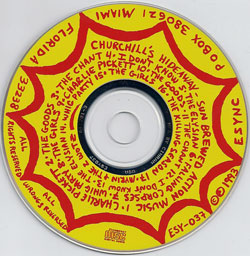
Sun Brewed Action Music live compilation, 1993
Jeff: Did you set up the same way Charlie did when he recorded there, with everybody in that room?
Jimmy: Yeah, that's the same room.
Jeff: And then when the basic tracks were done, just shut off the snare drum, and started overdubbing, guitar and vocals in that same room?
Jimmy: Yeah, the bass was in a bass cabinet in the closet, in that room. And the guitar, he had a guitar cabinet set up in his kitchen, with a plug that ran into the kitchen, so you just plugged your head (amp) into it, from what I remember. And it went into the kitchen, and if you wanted to use your own amps, for overdubs, then you did that later.
Jeff: He got a really good sound out of that room.
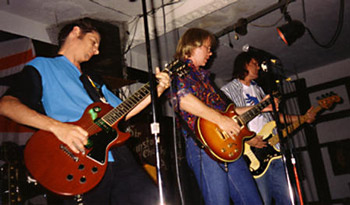
The Chant, Churchill's, 1993
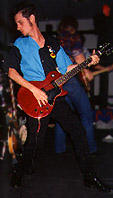
Greg Smalley
Jimmy: I guess it was just for the distribution. And we would never had been able to do the CD and LP. And the unfortunate, as you look back, the unfortunate cassette. Which always sells some, but not enough to really cover the...If it had just been the LP and CD it woulda been fine. But the cassette puts more money on your back.
Jeff: Yeah, before CDs really kicked in hard, cassettes were a going concern.
Jimmy: And the sessions with Joe Hamm and Pat later on, in Atlanta, they were also very seamless, there was hardly any problems at all. We had rehearsed, and put a lot of work into getting those songs down. And it shows, I think. It was a beautiful studio, it's now a parking lot. I did a lot of work in there.
Jeff: When did Joe Hamm start playing?
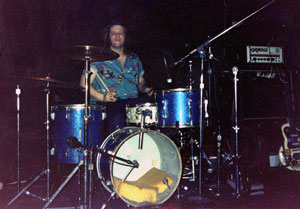
Joe Hamm
Jeff: And the thing you told me about Pat Johnson's time in the Chant, was that he never unpacked his suitcase. And not in a negative way, but he had things that he wanted to do, and...
Jimmy: Pat never really, he never really hung his hat anywhere.
Jeff: Right. He played with Charlie for one tour, and...
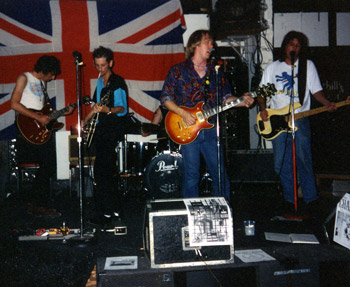
The Chant with John Salton (left)
Jeff: And you've kept up with him through the years?
Jimmy: I've stay in touch, but not as much as I should.
Jeff: He plays with Penelope Houston now, still a great player. Came to Florida a few years ago...Good guy.
Jimmy: Yeah, still great.
Jeff: Do you remember how many were pressed of Two Car Mirage?
Jimmy: I think again, I think 3000 sold. But I'm not sure if that's all together, including the CD and the vinyl. Or if it was just the vinyl. Because again, sorry, for whatever reason, there was no accounting from DB (Records). "Yeah, well, we'll get to it. We'll get to it." It's 2009, and this was 1991, and we still haven't seen anything on any accounting. It's all water under the bridge, if you made any money, oh well, you know? I guess he needed it more than we did.
Jeff: And mainly thanks to you, we have a good selection of Chant gigs on tape. Any favorite gigs that you remember?
Jimmy: Actually one of my favorite gigs I can't find. And I think the unfortunate thing about it is, that I think it swayed in the machine, I think the machine was getting old and it swayed (tape wobble). And I also remember that the person we that left in charge of turning it on and off was tippin' it up (drinking).
Jeff: As usual, probably missed at least half the first song.
Jimmy: And I know for a fact, did not turn it on when we started, and I had to (Yells) "HEY! Turniton!"
Jeff: A constant concern, many live Chant cassettes are missing part of the start, 'cause the bass player cannot make sure the tape recorder is started. (because he's onstage)
Jimmy: That's right. And you can't really control what's going on. Frank was on drums, Walter and me, and again...I'm 100% sure it was Mike (and I'm 100% sure it wasn't, because Mike was long gone before they moved to Atlanta--Jeff), and Kevn Kinney from Drivin' and Cryin'. Who was, who we were all real tight with, I was very tight with Kevin, he actually lived next door to me at the time. It was at a place called the Dugout, where at least one of the Indigo Girls was a waitress there (back) in the day. Mr. Crowe's Garden started there, which turned into the Black Crowes. They didn't start there, they started at the White Dot, but they played the Dugout, and Steve Gorman, who ended up being the drummer for the Black Crowes, he was the door guy. And it was a great place, 'cause I remember playing, when we played that thing with Kevin, it was nothing more than somebody said "Oh, we can put a stage back here." So they just put some wood in the corner. And then they finally built a stage, on the other side of the room. And it grew in popularity like crazy, I mean EVERYBODY played there, we had...major label acts from all over the country played there. Nobody that would draw 10,000 people, but people you'd heard, like Joe "King" Carrasco, who was big at the time.
Jeff: How many people did it hold?
Jimmy: Probably less than 300. It was a restaurant in the day, and I think, during a certain time, in the evening you could order (food) up to a certain time, and then it cut off, before the end of the night. And it was a great place, and that gig with Kevin, and then Bruce Wismer played organ on some songs too, I think that was the same night, or it might have been a different night. But those 2 gigs at the Dugout, in the back corner, were really hot. Because we were trying to prove (ourselves), and then we had Bruce playing the organ, and Kevin playing guitar, and people were paying attention.
Jeff: So that's a tape that we have to look forward to you finding. If it's not wobbly.
Jimmy: Yeah, but I got a feeling it's bad, I got a feeling it's gonna go "weeorghweeorgh" But we'll find it, we'll find it first. And I'm lookin' for that, and so...those were pretty hot gigs, and then...we did one at 688 (club, Atlanta) that I really enjoyed.
Jeff: Did you headline or open for somebody?
Jimmy: I think we opened for the Coolies. And then we played (it) again when it was the Rollick, after they changed ownership. And we were supposed to open for somebody, but they cancelled, so we played with somebody else, I don't know if we played first or second. But again, it was a good set, it was Frank and Rich.
Jeff: 688 was a good club, good sound.
Jimmy: Yeah. Then we played 688 space after it was the Rollick, then it turned into a gay bar. Then the gay bar decided they were gonna have rock'n'roll bands. So we played there with Right As Rain, I think. But it was like, on the dance floor. Not in the same place as the stage used to be. And nobody was there. But it was good fun 'cause we played with our good friends Right As Rain. We had a great time.
Jeff: The last Chant gig was in 1993 at Churchillís. How long before that did it stop being a regular thing? You guys would come down to Florida and play occasional gigs at Churchillís, but when did the gigs in Atlanta stop? Or did they ever stop?...
Jimmy: Well the last time we played was Greg Smalley's memorial service (1996). And, um.......certainly before then we didn't really play for a long time, but we played...they were far and few-between.
Jeff: Even after Three Car Mirage came out?
Jimmy: We tried to play as much as we could when the record came out, but it started to die off...rather quickly, maybe, maybe not rather quickly. But at a certain time...we tried to keep it goin', it was still tough, it was a time when...we weren't as young as we were. And really, we had to work (day jobs) a little bit more, I had already bought my first house by then. And I was working at a job, albeit a decent, hardworking job, it still wasn't paying as much as I needed to make a living, especially carrying the ticket for that particular house. And things just weren't going well at a certain time, period. And so, it started to take a backseat, at least for me. And Greg got sick (Greg died of AIDS), and it just started to fall apart. And we would get gigs like, if somebody cancelled at the Star Bar, Greg would say "Oh, so-and-so cancelled. Let's play." And maybe we would get a day to rehearse, and maybe we didn't. I remember a time where he called up and said "We gotta play.", Joe Hamm was not available, and there's this guy that played with the Lost Continentals, his name was Mike Hammer, I forget what his real name was. But people know him as Hammer, or Hammy as we called him. And he just..."Ok, I'll play." And we just go "It kinda goes like this." (went over the songs with him briefly) "Ok." And god, he just...I wish I had it on tape, because he played almost just like we had actually rehearsed. But he just had such a feel for playing, he's SO good. He got kinda famous in Ohio, in the late 70s...
Jeff: And you had Sam Hughes in the band for a time, and the thing that struck me was that it sounded very different with him as the second guitar/keyboardist. It sounded almost, at times, like it could be a different band.
Jimmy: Yeah. I really enjoyed the fact that he could lend a keyboard to that, it was a really great thing, he...played rhythm guitar, he didn't have any aspirations of being a lead player, you know? He was a great time-keeper, he played really great rhythm guitar, and he did some really great keyboard stuff. He had this old Farfisa (organ) that I actually have, it worked back then, it doesn't now. And it's still got the set list taped to the keyboard. And, um...it's a shame that we didn't continue on with him, he was really good. I don't know...what everybody else thought, but...pretty much everything was recorded, we didn't have anything new, that he played on.
Jeff: And now 2 ex-Chant members are deceased, both of which are know for their contributions to the Atlanta scene.
Jimmy: Yeah. Well there's actually 3. The first was Greg Smalley. Great guitar player. He played in many, many different bands, he booked the Star Bar, he was single-handedly responsible for Bubbapalooza (festival), which is at the Star Bar every year. I'm pretty sure, without knowing which bands they were, he certainly helped a lot of bands with their careers, whether they continued on to this day or not, but at the time, they got pretty big, and I think it's certainly because of him. This whole Redneck Underground thing started to bubble up out of that, which included Deacon Lunchbox, and Smalley, and Slim Chance And The Convicts, and at some point the Vidalias touched on it, 'cause we were a country/rock/alternative...
Jeff: And Deacon Lunchbox did An Evening With The Garbageman, and out of that come The Jody Grind.
Jimmy: Right. But Greg would get these bands that no one had heard of, or would get bands that didn't play much, and put 'em on, to let them play. And he would bring down bands from North and South Carolina, and Kentucky, and places a little bit north of us, that nobody had ever heard of, and they were great. It was like "Oh my god, these (guys) are fantastic." And he was just a wonderful guy, he was very unselfish...he was a HUGE contribution to the scene. And when Joe brought him in to rehearse with the Chant, I had just gotten my house, and Walter had just gotten married, at the time. And we set up in the living room, and of course we didn't go over anything, but this is the kinda guy he was. He listened to the record, BOTH records. Learned every song on both records. And knew all the guitar parts. So when we were done, Walter says "That's my part." "Ok." "So you just play the chords, or find something else to do there, but that whole thing is my part." "Ok, no problem." So the next time through, he didn't play it.
Jeff: You said he knew all of Walter's parts too.
Jimmy: He knew every part. And he knew all the third parts, in there. Like the parts...like there's one song that I did at John Keane's, that there's a part that I heard, I said "I just have to put in on here, let's see, we don't have to keep it, but...I hear it." And we kept it, and that's the part that he played in that song. When we played that song, he played my part. I thought that was pretty good considering the fact that...I was the bass player. But it wasn't like that in the Chant, really, that "You're the bass player, you can't do it." As a matter of fact, Walter had a song, at the very, very end of the Chant, where I could never get the bass part. And I always thought, in my mind, that if we cut this, that he would just have to play it, because...I might be able to fake it live, but if we were ever gonna cut it, and it was to be listened to over and over again, it had to be done right. And I have absolutely NO idea why I couldn't get my brain around it, but I just couldn't, and that's the way it goes. But we never cut it, but he did, he cut it with the Dot Commies, and it sounds great. 'Cause the other guy could play it.
Jeff: And Frank Mullen, after he left the band he got into photography.
Jimmy: Yeah. He was actually into photography before the band.
Jeff: Ok, so after the band he got MORE into photography.
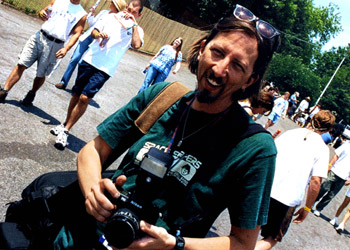
Frank Mullen; photo by Jim Johnson
Jeff: Well, that's good, because you 2 were the rhythm section.
Jimmy: I know, but there's people in the bands that you're friends with, but you don't go over to their house almost every day, you don't call them every day. You don't see them almost every day, like Walter and I do. But we don't see as much of each other now, 'cause we're both older, and have many other things to worry about in our own personal lives. But we do see each other quite a bit, we do talk on the phone quite a bit. Not as much as we used to, but still, quite a bit. And the same with Bill Ashton, I don't talk to him as much as I used to, but I still do. But then Frank, he moved away. And so I didn't see him for a long time. But we would write back and forth...periodically we would call, but there wasn't so much of that going on. But then he moved back, and of course, the Chant had long moved on, and by the time he moved back, was pretty much on that...just playing 4 times a year, whenever Smalley could get us a gig when somebody else cancelled. (laughs) But then we connected again...and then I would see him...all the time at shows. He started really, like you said, just really going deep into photography. And it's like "Wow, this is great!" And I would get to see him all the time, because he was always be somewhere taking pictures, so it was great. And then he got cancer. When he first moved away to Colorado, he had a bout with it, and was cleared up, they said. It went into remission. Apparently, without knowing all the full details, it was 2 different kinds of cancer, the first one was cured and went into remission, but the second was a different kind of cancer, was the one that actually popped up, and killed him.
Jeff: A lot of people that know about his photography, and know how good a photographer he was, had no idea that he played.
Jimmy: Yes, exactly.
Jeff: From reading some articles after he passed...
Jimmy: Oh yeah, they wouldn't even mention it. They wouldn't even mention Roach Motel, who were 10 times bigger than the Chant. Nobody said anything. There was very, very, very few, and really, quite honestly, to tell you the truth, the only 2 obits that I read that mentioned him drumming, either in the Chant or in Roach Motel, were local. And the only one that mentioned the Chant, that I know of, was in Stomp And Stammer. And that's simply because Jeff knows Walter and myself, and he knows that Frank played with the Chant, so he just put that in there because he knew that, he didn't have to be told. And another paper mentioned Roach Motel, I think singly. But he was a great guy, and I miss him terribly, like I don't belittle anybody that has passed on, but I...I just wouldn't be lying when I say that I probably miss him more than anybody.
And our other band member, Michael Mills the drummer (NOT Mike Mills the bass player in REM), or percussionist, as he used to like to say. He was a great guy, really good. He was the drummer on the Chant house party (the Chant played an Atlanta house party while Mills was their drummer, and it was recorded) CDs that you made. He came in, like Smalley, he came in and learned EVERYTHING, it was incredible, when we played the first time, it was like we had been together for a YEAR. But he moved out of town, and we didn't see him for the longest, longest time. And then I hear from somebody else that he's got a brain tumor, I think it was. And then the next thing I know, he's gone. And so, that was a real shame, and the only things we have with him are live, we don't have any studio stuff. But he was a super-sweet guy, and he...even after he moved up to Ellijay (Georgia), which is really far away, he would come to rehearse. It would be like if you lived in Ft Pierce, or Ft Myers, and came down here to rehearse once or twice a week. And "Can I give you money for gas?" "Ah no, don't worry about it." And I said "We're not making anything, you're really doin' us a favor, and I really hate that you're the one that has to come all the way down..." He goes "I don't care. I just like to play." It's like "Ok." And he stayed with us, and he moved away, but then it became arduous, and he finally had to stop comin' down. I guess maybe work or something.
Jeff: So if the last time the Chant played was at Smalley's memorial, then the Churchillís '93 was the second-to-last gig?
Jimmy: Pretty close.
Jeff: Or close to it. And that was a very memorable gig, a lot of songs played, some that didn't get played often. Rich came up and played, Johnny Salton came up and played...
Jimmy: Yeah, that was a fabulous gig. Actually all 3 of the Churchillís shows that we did, the first one was especially memorable because it was SO packed. And I have to say that I have to attribute that to the fact that Charlie played with the EAT. So it was like the EAT with Charlie, so there was 3 guitar players...
Jeff: They Yeehaws.
Jimmy: The Yeehaws. And us. So it really brought out all these old people, who had stopped going (to shows). So there was 3 reasons to come. And so I can't say "Oh yeah, The Chant came down, and WE sold out Churchillís." Well, ok, aesthetically, we were headlining, so maybe. If that's the right word.
Jeff: You could say that and get away with it, but...
Jimmy: BUT, you also had the EAT and Charlie play, and that was fabulous beyond fabulous. And I think Boise and Moss opened, if I'm not mistaken. Which we did not see, because (sarcastically) we were too busy, we were in our trailer, and our people were keepin' everybody away, it was just awful. No, we...we just, there was so many of us, we just had to...we were at Walter's parents house way up in Hollywood, and we just didn't make it down in time. So, the second time (at Churchillís) was pretty good. And then the third time nobody showed up. Well I take it back, it wasn't sold out, so nobody showed up. It was a moderate crowd.
Jeff: You said somebody else was playing that night.

The Chant with Jeanette singing
Jeff: But it was still a good gig.
Jimmy: And the reason why we pulled out everything is because...we knew that...we didn't know when Greg was gonna pass on, but we knew he was going to pass on, everybody knew it, he knew it. And we wanted to play here again, and we wanted to just play everything. And we pretty much just played everything. And the thing about Greg, and his connection with the Chant and everything else that he did, is that a lot of people don't remember that before the whole Redneck Underground started, and before the whole Bubbapalooza thing started, he played with us. And when he did the overdub for Wonderin' Out Loud, it was the first time he was ever in a multi-track studio. The first time he was ever in Florida, much less on the beach in Florida, was with us.
Jeff: Tell the story about him coming in and putting lead guitar on Take A Giant Step (from the Monkees tribute album).
Jimmy: He came in on his lunch break (from work). Did it in like 2 passes. Threw his guitar down and said "Gotta go." Went back to work. And that's just kinda the way it was, and Wonderin' Out Loud wasn't really much different, only he didn't come in on his lunch break, but there wasn't a whole lot of time spent. There was work done on it, he put the time in rehearsing with the band and this and that, but there wasn't a whole lot of work that he did cutting the track, he didn't slave over it for 8 hours, and finally decide that he liked the 35th take better. It was within 2 or 3 takes easily, from what I remember.
12--JIMMY SOLO
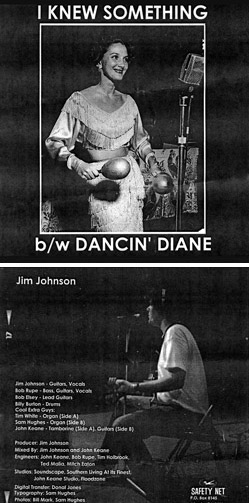
Jimmy Johnson 7", Safety Net 1993
Jeff: And about the time that the Chant was starting to wind down, you started working on some solo stuff.
Jimmy: Yeah, Walter met somebody and moved down here, he was gone for a long time. And so I didn't have anything to do...
Jeff: So you started cutting tracks with Bob Elsey?
Jimmy: Bob Elsey and Joe Hamm. And those were like, no more than 3 takes. Some were even 1 take.
Jeff: And you released a single from those sessions on Safety Net. Do you remember how many of those were pressed?
Jimmy: 300, maybe. 200 maybe.
Jeff: And hopefully the rest of that stuff will come out in the future.
Jimmy: Next year, I say that every year. (chuckles) But we'll see. I mean, some stuff has escaped. I have more songs, but again, it's just a case of...time, energy and money. But you know, I recorded songs with the Bogues, and I recorded songs with the Skylarks. Well, I re-recorded one of the songs from those sessions with the Skylarks (Joseph), on that record (Suitcase City), and that came out eons ago. And we (The Skylarks) have 3 songs that we've started for the next record. And they aren't finished yet, but...it takes time, because everybody has commitments, it isn't like the old days. Mike and Megan have a child, and they both work, and so there's a whole lot of stuff going on with everybody.
13--THE VIDALIAS
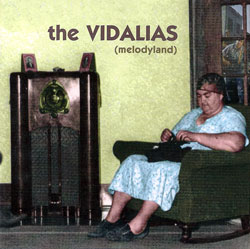
Vidalias (Melodyland) CD, 1995
Jeff: So I have a single and a CD from the Vidalias, is that all there is?
Jimmy: No, there's 2 CDs and 2 singles.
Jeff: And how many years does that cover?
Jimmy: 7 years, I think. I wanna say 7 years because I said that to somebody. And whether that's wrong or not is anybody's guess. It might be 6, because it seems to me that our first...our first gig was 1991. And then our last gig was in '96...or maybe '97.
Jeff: And you toured fairly extensively with them?
Jimmy: Well, I wouldn't say we toured extensively, I toured more with the Vidalias than with any other band. And sometimes it was just a run up here, and a run up here, and a run up here. But there was 2 times when we actually went on the road. And this one time when we went all the way up to Long Island, to Montauk. And we played New York 3 times in 1 day. And 2 sets at 1 club, so it was 4 times, it was great. It was a thing for Columbia University, a thing called "Music Worth Hearing". And it was at the Bottom Line, incredible. Can't get in the Bottom Line through the force of god, and of course now it's closed. But they had this thing, and they would book the bands that they liked, and they liked our first record (Melodyland). So they said "Would you come up and play this thing?" Probably for free. (laughs) So there has to be money generated around it, so then a tour was booked around that.
Jeff: And where else did you play that day?
Jimmy: Well, we played Columbia University, who put the thing on. So we played inside the studio there. Then we played in the corner of Tower Records on Broadway, at rush hour. And then we went back, did a soundcheck, and played 2 sets that night, at the Bottom Line. And Joey Ramone was there.
Jeff: Were you well-received?
Jimmy: Yeah. Joey Ramone said we didn't suck. He said to one of the girls in the band, who he actually came to see, was her in this other band. And because we did (the Ramones') Questioningly, he stayed to see us do that, we opened with it, so we could get it out of the way, so he could leave. And so he leaned down and told her, he says "Tell them they didn't suck."
It's like "WOO-HOO! That's the greatest thing I've ever heard." And it was great, I mean it was just fabulous...to see him.
Jeff: The Bobs had a song about Joey Ramone. (on their live cassette)
Jimmy: They did.
Jeff: Did you see any of that at the Tampa Theater? (the Bobs opened for the Ramones at the Tampa Theater 7/25/81, my first exposure to south Florida punk, and Jimmy was there)
Jimmy: I...I know what they were talkin' about. It's...it's kinda one of those things where.......the trouble is, with that song, for me, I have a big problem with that song. And the big problem with that song is, it's really back-handed and mean, ok? It's mean-spirited, I don't think they really hated Joey, but they were just writing about the situation, ok? A particular thing. The poor guy...
Jeff: That song could be taken the wrong way.
Jimmy: Oh yeah, it's real, it is mean, to a certain degree. I mean, he DID stink. Because he had that OCD, right? He never changed his shirt, he liked that shirt, so he lived in it for a year, or whatever it was. And he just shuffled around, sort of aimlessly, and...And they said that line, "Boy, you really smell bad, it's time to change your shirt." Well, I'm sure a lot of people thought the same thing, but nobody would really say it.
And then some of the other lines in it, were probably telling the truth, but it was the brutal truth. And then you put it all together, and it's like "Man, they really musta hated this guy." Well, they really didn't, but it was just an observation of the day.
Jeff: They didn't mean it to come out as mean as it did?
Jimmy: I don't know, you're gonna have to ask Kevin or Bob, whoever wrote the lyrics, how mean they wanted it to be. Kevin sang it. But it's also (scats the tune of Joey), it's real happy and up, it's really cool. It's like "Wow, this is really great."...then, "Oh wow man. You're really mean to Joey, man." But it's such a great song. So that's the problem I have with that song. And it was another new song, and everybody loves a new song, so it's like "Ok." And it's all so much water under the bridge anyway, the poor guy's gone, nobody really ever heard that song, so it's a moot point, of course.
Jeff: Ok, so back to the Vidalias. 6 years, 2 albums and 2 singles. Your memories of that band, did you enjoy playing in that band?
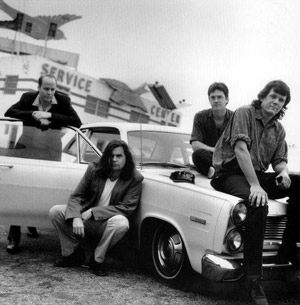
The Vidalias
Jeff: How'd you get into country music in the first place?
Jimmy: Well because Page (Waldrop, Vidalias guitarist), my great friend Page who worked at the music store, who incidentally, had seen Charlie play, and had seen the Chant play periodically, but I never knew him. He said...(suddenly begins reciting up-to-date facts about the songwriter of the Vidalias) His name's Charles Walston, he's got a great record out under The Bourbon Dynasty, under that name, he plays in Washington D.C., and he's a great songwriter. (resumes previous story about the origins of the Vidalias) And he had a band with people...that I guess were moving on, or something, they really didn't wanna be in a band, or something. So he wanted to get more of a full-time band together. And so Page said "Do you wanna play with this guy?" And I said "Well, I guess." I was playin' in the Chant at the same time, but it was...shaky, it was 4 times-a-year kinda thing, ya know? So I did, and that's how I got into it. I think the first record is really great. The second record is hard for me to listen to, I don't think it's really anybody's fault, but...there's lots of circumstances.
Jeff: Sometimes these things work out, sometimes they don't.
Jimmy: Well, for me...Smalley was dying. He was on the cusp of dying, he died during the making of the record. I was having a hard financial time, I was pretty much...knowing I had to sell my house, before I actually lost it, so...All these things preyed upon my mind, and the fact that I wasn't really...
Jeff: So it's kinda a situation where when you listen to that...
Jimmy: ...All that comes back.
Jeff: You think about all that misery you were going through, and you can't listen to the songs just for themselves.
Jimmy: It's like I can't listen to it, yeah. Well, I try to separate it, and then I just...there's just a lot of things that weren't right. And it's also the old sophomore curse that people like to talk about. The first record was so easy, despite the fact that it was 3 drummers, done in 3 different places. Those guys were so easy to play with, and the songs just fell into place, and the studios were great, and everybody involved with the studios were great, and it just fell into place. This (Stayin' In The Doghouse) was, "Oh, it has to be this way, it has to be that way." And I think there were some people that over-thought the whole situation, and it really ground it to a halt. And I thought to myself "Well, we have new songs." Perhaps looking ahead to the third record, which never showed up. But the Bourbon Dynasty record has 4 Vidalias songs that we played. And they did a great job. They're fantastic songs.
Jeff: Are you memories of the band good overall?
Jimmy: Yeah. There was a few months that was tough for me. But overall, yeah. And it was a great learning experience, especially on the bass, 'cause I was so used to not playing like that. A whole totally different way of playing, and a whole totally different way of understanding the bass, and...
14-THE SKYLARKS/THE BOGUES/MORE SAFETY NET
Jeff: And when did you start working with the Skylarks?
Jimmy: Right at the end of the Vidalias. 'Cause I knew it was ready to go. It's like "Ok, well, I know this is gonna blow up." And Mike and Megan lived right down the street, and we rehearsed in their basement, so really it was just a...literally a minute and a half drive from my front door, to when I opened the door to their house.
Jeff: Have the Skylarks played outside of Atlanta?
Jimmy: No.
Jeff: But there is a new record in the works.
Jimmy: Yeah.
Jeff: And you're pretty happy with how it's gone, even though you've just started.

Jimmy in the Skylarks
Jeff: You probably play every 2 or 3 months, or is it more or less than that?
Jimmy: We played, we broke our record this calendar year, at 5 times. SCORE!!!
Jeff: And it's not over yet, you still got another...
Jimmy: We're not gonna play this year.
Jeff: 5 is enough.
Jimmy: (facetiously) 5 is enough, I put my foot down. Our last gig was a private house gig, and it was real fun, it was incredible. The Long Ryders was our first gig of the year, and that was phenomenal.
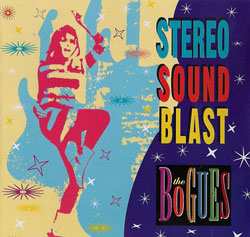
Bogues Stereo Sound Blast CD, 1995
Jimmy: The Bogues were a great pop band. I loved the Bogues, I played my Hofner bass. I had to channel McCartney the whole time I was playin'. I was in that band for less than a year, but we immediately made a record (Stereo Sound Blast). As soon as we had enough songs to make a record, we made the record. We even did a song that we rehearsed, like once or twice, we did it, and there's a huge bass clam (mistake).
Jeff: Where can I get this record?
Jimmy: From Clay (Harper, who runs casinomusic.com). (chuckles) He's got 2000 of 'em in his basement. It was so much fun, those guys were so much fun. There's a song (of mine) called Florida, and I did it with them. It was like "I've got a song, I've got a song." And it all fell together by the fourth time through, that's it, it's done. I wouldn't say that you could record it the fourth time through, but... There was song we did that we only rehearsed once or twice. Mark said "Let's do this song!" "No, I don't know it." One-two-three, and they all started playing, I had no choice. And so, I missed a turnaround. But you can really hear it, it's not like "Oh, nobody's gonna notice." Yes, you do notice.
Jeff: Clam.
Jimmy: Clam BAM!
Jeff: Clam. So what happened to that band?
Jimmy: They continued on. The Vidalias were getting signed, and it looked like it was gonna take a lot more time, and...It looked like, and as a lot of these things happen, it looked like, "Well, maybe we're gonna do something." So I have to put, I put all this time in, I can't just say...It wasn't like the Martyrs versus the Chant, because we were just...playing locally, there wasn't anything like that going on. And this was going on, and so we had to...I had to make that decision. And the Bogues actually put out 2 more records, they actually have 3 records. One of 'em has Charles Wolf, the drummer from the Brains, a great drummer. He played with the Vidalias for one gig, to fill in, 'cause we didn't have somebody (to play drums), but it was booked.
Jeff: Ok, let's go back over some of the Safety Net stuff that we haven't talked about. Why didn't Open Records put out the first Bobs record?
Jimmy: I think because they broke up. And they (Open) said "Well, then screw that."
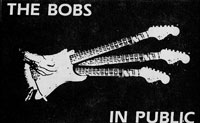
Bobs In Public cassette, Safety Net, 1985
Jeff: And the Bobs' In Public cassette release is one of my favorites, do you remember how many of those you did?
Jimmy: I think we made 50.
Jeff: Only 50?
Jimmy: I think so.
Jeff: And those were much cheaper than vinyl, right?
Jimmy: Oh yeah, they were like 90 cents a copy, or something.
Jeff: And you put out a single by the Nightporters, tell me a little about them.
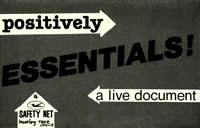
Unreleased Essentials Live Cassette
Jeff: The Essentials live cassette (Positively Essentials, recorded live at 27 Birds in 1983) got as far as having cover art and a Safety Net catalog #, but was never released, why didn't that ever come out?
Jimmy: No idea.

Chant Christmas single, Safety Net 1988
Jimmy: I don't know how many we made, 300 maybe, 250. It just seemed like the thing to do, I always wanted to do a Christmas record, and had the money, so...Walter and I sat down with our ebows, and we did We Three Kings, and put that little piano part in the middle, from another song, and I can't think of it right now, sorry...which seemed to fit. And then the other song on the back, was Charlie's song "Bullshit Going On", and that was Rich and Frank and Walter and meself, and that was at the Rollick.
Jeff: The best Charlie Pickett song you never heard. So hopefully the rest of that gig will surface at some point...
Jimmy: It is on a cassette somewhere. I do have the multi-track of it, but I just have to...again, the money to mix it.
15--FALSE ENDING AND MONKEES ETC.
Jeff: Is there anything else you would like us to know about yourself?
Jimmy: No. You know WAY too much, and it's just...(was he gonna say sickening, irritating, ???)
Jeff: You made a lot of great music, and made a lot of great music possible for others to hear. And we appreciate it.
Jimmy: Well thanks. I like doin' it, it's all done in the passion of...not of the moment or of the spirit, but it's done, to do it. Certainly everybody wants (to make) their money back, at least. You try, and most times people lose their shirts. And one thing we didn't touch on was my Monkees compilation.
Jeff: YES! I forgot all about that. Tell me about it.
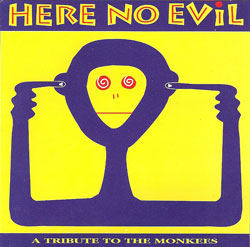
Here No Evil Monkees Tribute CD, 1992
Jeff: That you've ever worked with.
Jimmy: Yeah. The people that HAD the money, that didn't put the time, the money, and the effort into it. And they made sure these records got out there. And THAT is why the Monkees compilation made money. And they also did their accounting, TO THE DIME. Or the nickel. Because they wanted to know how much they were putting in, and how much they were getting back.
Jeff: And you also did a live show, with some of the bands that played on the compilation.
Jimmy: Yes.
Jeff: And that came out really good.
Jimmy: That was phenomenal. We played at The Point, and we were trying to get the Variety Playhouse, which held like 1200 people. And we thought "Well, what if nobody comes to this? Then you're gonna have a 1200-seat room, with 50 people. You're gonna have more people in the bands then (in the audience)." We went back and forth on it, and in the interim of going back and forth, they (Variety Playhouse) booked, I believe, and I could be wrong, but I think it was John Wesley Harding and Mare Winningham, the actress, who also had a record out at the time. They went in the space at the Variety, down the street. We had, The Point was sold out, from the minute the doors opened to the minute they closed, there was still people in line. And I think that we could've, maybe not done 1200 at the Variety, but we could've done 50%. And we would've gotten more people, because of the people who didn't wanna wait in line, or the people that drove by and said "We're never gonna get in there!" And it was amazing, the bands that played really, really pulled it out, Mitch Easter (had a band called Let's Active in the '80s) came back from a European tour, took a shower and a nap, and drove to Atlanta from North Carolina. This is what I hear. Whether there's a little bit more to it than that, or whether somebody is just condensing it, I've never asked him. But he showed up, (and) I could not believe it. And he showed up in time to rehearse with the band, to do the song that he did, which was "Valeri". So what we did is, we said "2 Monkees' songs, and an original (song)." Or 1 Monkees song and an original, that's what it was. Whatever you recorded for the record, and either another Monkees song or an original. Because some people were going "Oh, we don't wanna play 2 Monkees' songs." We got some grousing. And I said "Ok, well then play an original." Then some bands played 2 Monkees' and said "We didn't know we could play an original!" That probably came in the planning, and the first band to complain about 2 Monkees' songs, then we said "Do an original." And that other band didn't complain about doing 2 Monkees' songs, so...But everybody who came did a great job, they put in 110%. And there was even one band at the time, called Doll Squad, that turned into Catfight later on. And nobody who played was rich, ya know? Nobody who played can just throw money away. The girls, the one girl who's still a really close friend of mine, a great friend of mine, she went out and had her hair done, in a salon, up in a huge '60s bouffant. Which couldn't have been nothing, it had to have been...
Jeff: At least $50-$100.
Jimmy: It had to have been something. You know she couldn't afford that, in any given day. But yet she DID that, she went out of her way to do that, to make NO money. And it was unbelievable, the dedication that these people put in. Multi-Color house came up from Tampa, with a bunch of people, they brought a bunch of people with them. And they stayed, I think they managed to all get places to stay for free. But I couldn't put everybody up, I think Sam (Bond) and Natty (Moss-Bond, members of Multi-Color House, then Sparky's Nightmare) and another person stayed at my place, but the rest of 'em had to find places to go. And they spent gas money and god-knows-what, to get up here to do it. And it was fabulous. And at the end of the day, everybody got about $100. It wasn't $100 per person, it was $100 per band, so...It was incredible. And the record sold fairly well. It got pretty good reviews, there wasn't anybody who gave it a bad review, and it actually even got mentioned in Rolling Stone. Where a guy was writing an editorial about "Get me away from these compilation albums. Can't people make any original records any more? Why do you have to keep covering stuff? Albeit the Monkees' record's pretty good." And that was kind of in parenthesis. So there was our Rolling Stone mention.
Jeff: Ok, talk about An Evening With The Garbageman, which turns into the Jody Grind, and you co-produced their record with John Keane.
Jimmy: Yeah, at John Keane's (studio). Kelly Hogan worked at Wax N Fax (Records), Kelly Hogan, people told me, sang. I just knew her from there, not very well, but I just knew her from buying records from her. They were playing at the Cotton Club at the time. It was Bill Taft, Kelly, Walter Brewer, and Neil Freed on acoustic guitar. Well, Neil eventually left to do something else, for whatever reason, nobody told me. I couldn't believe what I was hearing. I thought Kelly Hogan had, and I still do, one of the best voices ever, unbelievable. Very unique.
Jeff: (she) Can sing all different kinds of songs too. Romantic ballads to shouters.
Jimmy: Yeah, she can do country, she can do hillbilly, knee-slappin' thing, or she can Ella Fitzgerald '40s crooning.
Jeff: No offense to Neko Case, who she's singing background vocals with, but she can probably blow her right out of the friggin' water.
Jimmy: God bless Neko, but I think Kelly could have her own career, but for whatever reason, we don't know why (she doesn't), and so be it. But she does come down and sing by herself sometimes, 'cause her ma still lives, just outta town. So she comes down, usually around Thanksgiving or Christmas, and she'll get some of her old cronies together, and she'll do a show somewhere.
Jeff: And you played one of the An Evening With The Garbageman shows, you played bass.
Jimmy: I did. But it was sort of An Evening With The Garbageman minus Kelly, 'cause she'd left.
Jeff: So she did 3 or 4 songs that night, then split. And you came on and played later. I did not realize that.
Jimmy: Yeah, and that band was Bill Taft on guitar, Walter Brewer on drums, 2 people that I had never met before, but became friendly with later on, Michael Lorant and Sheila Doyle, who were in Big Fish Ensemble.
Jeff: That you opened for with the Chant.
Jimmy: Right, we played with them. And they were great people, they moved to Boston, they live there now. And then Deacon (Lunchbox) did some of his poetry...all mixed in to this whole thing.
Jeff: Quite a singular character he was.
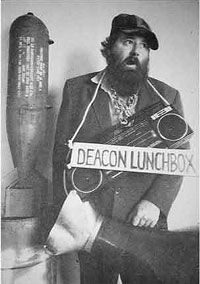
Jeff: Clams.
Jimmy: Clams. That's what we oughta call it. "An Evening With The Garbageman--Serving Up Clams." (laughs) The way that band came together, was Bill came over, and taught me the songs on the bass, while he just played guitar, and I guess he did the same with everybody else, and I didn't even meet anybody until we got together to play. I didn't know who I was playing with. But we all played the same songs, ya know?
Jeff: Ok, the Jody Grind.
Jimmy: And so then, Neil Freed leaves, the Jody Grinds becomes...ooh, I hate that when people put an S, but that's just simply because I'm loopy at this point. (that's right Jim-Jim, that's how we get the inside poop, we WEAR YA DOWN! it's not an interview, it's a friggin' MARATHON! it's over 4 hours at this point, we took ya out to lunch, then we started interviewing, and by the time we're done the supper bell will be ringin'...)
Jeff: I'm gonna keep askin' questions 'til you can't take it anymore!
Jimmy: (anguished cry, but somehow with an Irish brogue) I CAN'T TAKE IT! I'M TELLIN' YA! They (the Jody Grind) changed direction a little bit, tightened everything up, went to a 3-piece. And An Evening With The Garbageman was great, until it didn't work for this band. I don't know why, but they needed something shorter and sweeter. So they got the Jody Grind. And they tightened up their setlist, and they added all this great stuff, and some originals. Because Kelly worked at a record store, she was always goin' through records, and they were throwin' away...They do this song on the first record (One Man's Trash Is Another Man's Treasure) called "Big Shoes", which is a totally obscure song by some totally obscure woman (singer) from the late '60s, and she (Kelly) was particularly enamored by her bouffant hair-do, (and) the fact that she looked like a bus driver. And went home and played it, and thought it was great, and said "Well, we have to play this." So that was fabulous.
And I just said, "I cannot believe what I'm listening to." The creativity behind all of this, the Patsy Cline-like country songs and the and the Ella Fitzgerald-like '40s crooners and this crazy other stuff with the banjo, and it's like "Wow, what's going on here? The world needs to hear about this." And I said "I'm gonna pay for it, and we're gonna make this record, and whatever happens, happens. But if it's not made we're all gonna...be sorrier for it." And so we went over the John Keane's, and they had a guy that they would play with, a jazz guy, and he played stand-up (bass), upright. And John Keane put some electric (bass), and then some of it was just the 3 of them. And wow, they were...some people said "You're crazy to put money into this thing, you're just crazy. What are you doing that for? They're just ewww." You know?
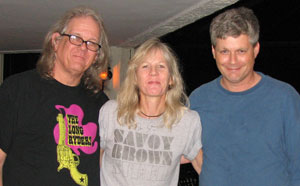
Jimmy, Karen & Jeff, Nov. 25, 2009
And I said "No, they're not." I've never heard anything like this, this is just killin' me. Even the guy who eventually put it out, Danny Beard, never went to see the band. And I would bring rough mixes, and play it in the back, where the DB (Records) office was.
The people who worked there would go "Danny, you gotta listen to this."
And he'd go "Uh-huh.", and he look for a record, and he'd just walk back down, didn't really have any interest in it. Finally, people started to really get interested in the band, they started to get really popular during this recording process. And finally, whatever it took for Danny to be interested, and then finally he said "Ok, I'll put it out."
So I said "Great, we don't have to got through that ridiculous label-shopping. Here's a guy right up the street, he'll put it out, it's all local, we're all there." Kelly worked for him (at one time), she didn't anymore. It's all the family, fantastic. Well, that's kinda where that ended. I'm gonna end it there. We put the record out, it was fabulous. It blew the doors off of any record that was put out that year, local or otherwise. It got incredible reviews. People were just...the buzz from the people in the REM camp, and Robyn Hitchcock and...who's the guy that did Roadrunner? That little guy who plays with just a guitar, and...
Jeff: Jonathan Richman.
Jimmy: Richman, incredible. Jonathan Richman would always hand-pick his opening acts. And he picked them, incredible. Poi Dog Pondering, they played with them, and with Robyn Hitchcock. Nobody could say anything bad about it, there wasn't one bad review. It got airplay all over the world. It was fantastic. So I was happy to have done that, quite frankly. (laughs) 'Cause that held a lot of water.
Jeff: And it holds up to this day. Do you wanna talk about anything that happened after that?
Jimmy: NOOOO. We'll just leave it there.
Jeff: Alright. We're Done. Thanks again.
Jimmy: Thank you.
©2009 Jeff Schwier